- Grades 6-12
- School Leaders
Check Out Today's Holiday Giveaway! 🎁

76 Easy Science Experiments Using Materials You Already Have On Hand
Because science doesn’t have to be complicated.

If there is one thing that is guaranteed to get your students excited, it’s a good science experiment! While some experiments require expensive lab equipment or dangerous chemicals, there are plenty of cool projects you can do with regular household items. We’ve rounded up a big collection of easy science experiments that anybody can try, and kids are going to love them!
Easy Chemistry Science Experiments
Easy physics science experiments, easy biology and environmental science experiments, easy engineering experiments and stem challenges.
Also, be sure to grab your free printable science experiment recording sheet to use with any of the experiments below.
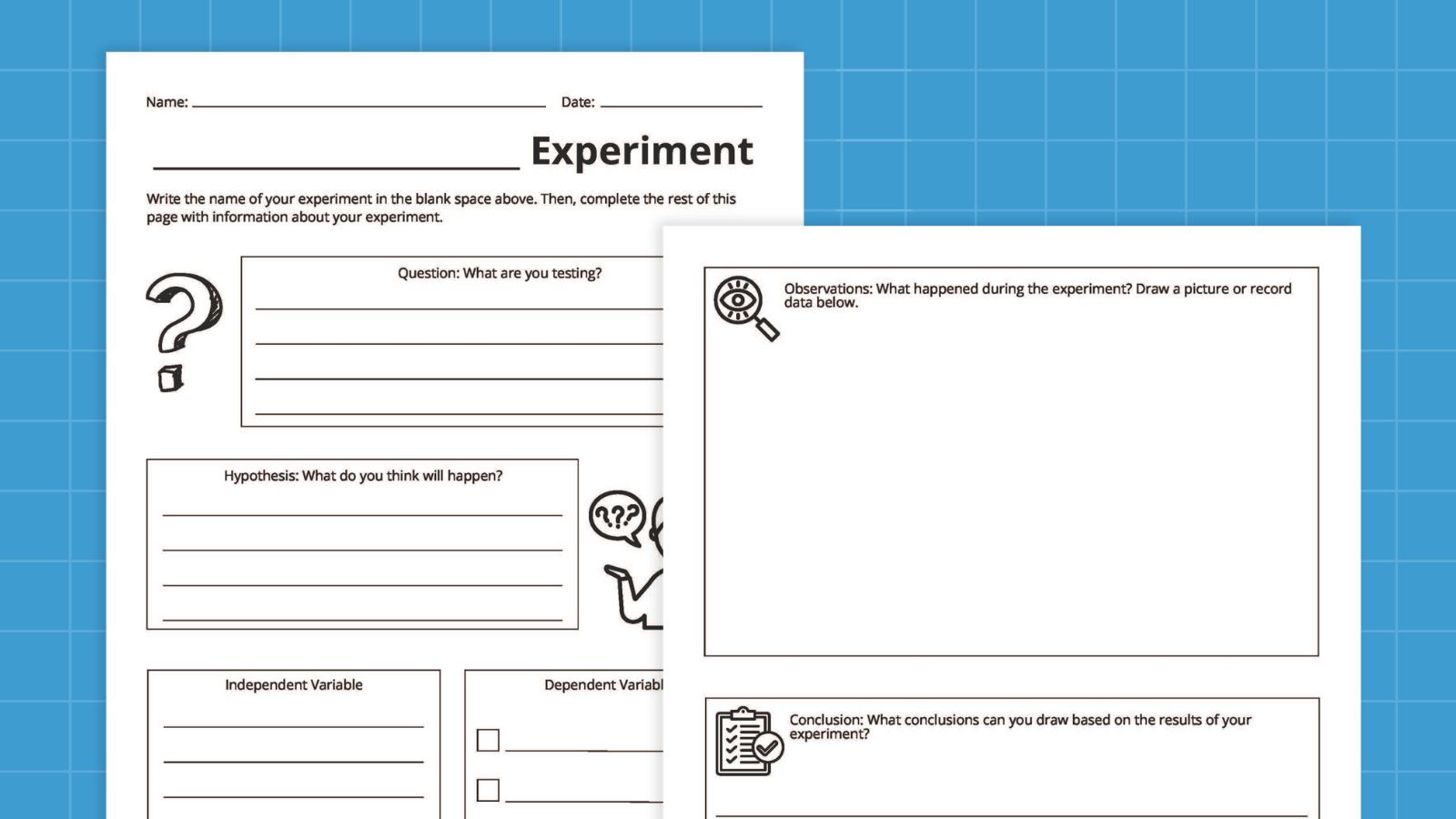
1. Taste the rainbow
Teach your students about diffusion while creating a beautiful and tasty rainbow. Tip: Have extra Skittles on hand so your class can eat a few!
Learn more: Skittles Diffusion

2. Crystallize sweet treats
Crystal science experiments teach kids about supersaturated solutions. This one is easy to do at home, and the results are absolutely delicious!
Learn more: Rock Candy Experiment
3. Make a volcano erupt
This classic experiment demonstrates a chemical reaction between baking soda (sodium bicarbonate) and vinegar (acetic acid), which produces carbon dioxide gas, water, and sodium acetate.
Learn more: Baking Soda Volcano (Guide + Printable Reflection Sheet)
4. Make elephant toothpaste
This fun project uses yeast and a hydrogen peroxide solution to create overflowing “elephant toothpaste.” Tip: Add an extra fun layer by having kids create toothpaste wrappers for plastic bottles.
Learn more: Elephant Toothpaste (Guide + Printable Reflection Sheet)
5. Blow the biggest bubbles you can
Add a few simple ingredients to dish soap solution to create the largest bubbles you’ve ever seen! Kids learn about surface tension as they engineer these bubble-blowing wands.
Learn more: Giant Soap Bubbles (Guide + Printable Reflection Sheet)
6. Demonstrate the “magic” leakproof bag
All you need is a zip-top plastic bag, sharp pencils, and water to blow your kids’ minds. Once they’re suitably impressed, teach them how the “trick” works by explaining the chemistry of polymers.
Learn more: Leakproof Bag (Guide + Printable Reflection Sheet)

7. Use apple slices to learn about oxidation
Have students make predictions about what will happen to apple slices when immersed in different liquids, then put those predictions to the test. Have them record their observations.
Learn more: Apple Oxidation
8. Float a marker man
Their eyes will pop out of their heads when you “levitate” a stick figure right off the table! This experiment works due to the insolubility of dry-erase marker ink in water, combined with the lighter density of the ink.
Learn more: Floating Marker Man

9. Discover density with hot and cold water
There are a lot of easy science experiments you can do with density. This one is extremely simple, involving only hot and cold water and food coloring, but the visuals make it appealing and fun.
Learn more: Hot and Cold Water Science Experiment
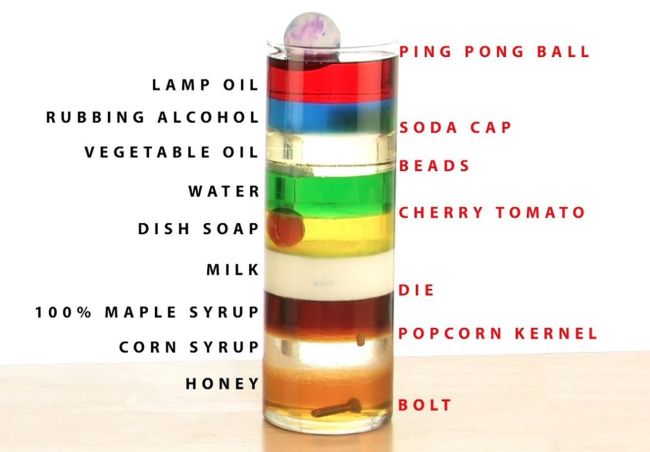
10. Layer more liquids
This density demo is a little more complicated, but the effects are spectacular. Slowly layer liquids like honey, dish soap, water, and rubbing alcohol in a glass. Kids will be amazed when the liquids float one on top of the other like magic (except it is really science).
Learn more: Layered Liquids
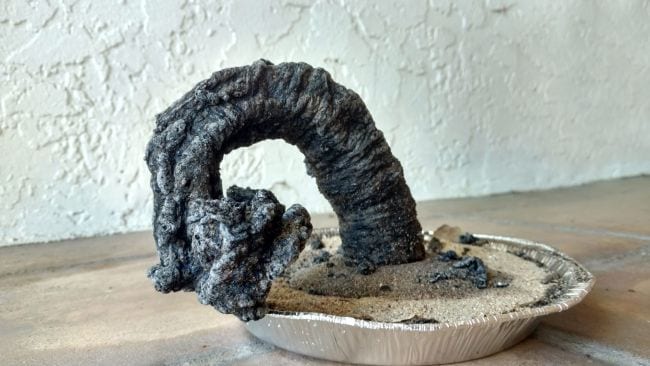
11. Grow a carbon sugar snake
Easy science experiments can still have impressive results. This eye-popping chemical reaction demonstration only requires simple supplies like sugar, baking soda, and sand.
Learn more: Carbon Sugar Snake
12. Mix up some slime
Tell kids you’re going to make slime at home, and watch their eyes light up! There are a variety of ways to make slime, so try a few different recipes to find the one you like best.
Learn more: 4 Slime Recipes (Guide + Printable Reflection Sheet)
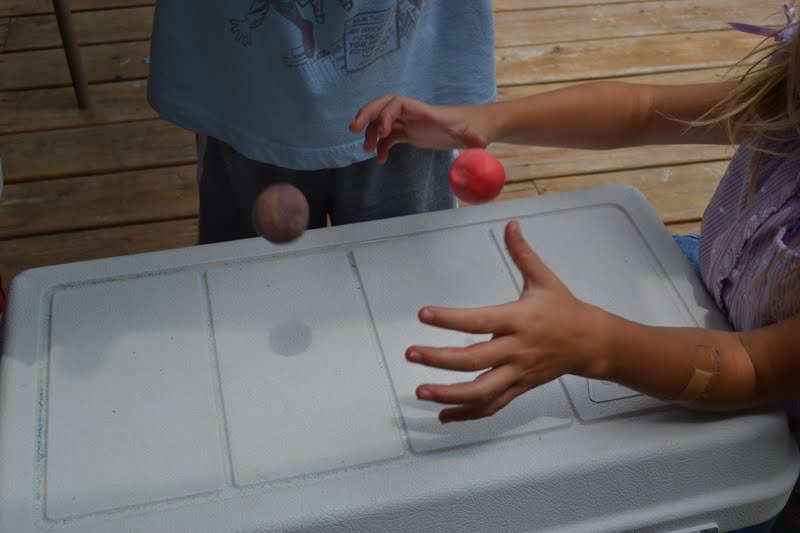
13. Make homemade bouncy balls
These homemade bouncy balls are easy to make since all you need is glue, food coloring, borax powder, cornstarch, and warm water. You’ll want to store them inside a container like a plastic egg because they will flatten out over time.
Learn more: Make-Your-Own Bouncy Balls

14. Create eggshell chalk
Eggshells contain calcium, the same material that makes chalk. Grind them up and mix them with flour, water, and food coloring to make your very own sidewalk chalk.
Learn more: Eggshell Chalk
15. Make naked eggs
This is so cool! Use vinegar to dissolve the calcium carbonate in an eggshell to discover the membrane underneath that holds the egg together. Then, use the “naked” egg for another easy science experiment that demonstrates osmosis .
Learn more: Egg and Vinegar Experiment (Guide + Printable Reflection Sheet)
16. Turn milk into plastic
This sounds a lot more complicated than it is, but don’t be afraid to give it a try. Use simple kitchen supplies to create plastic polymers from plain old milk. Sculpt them into cool shapes when you’re done.
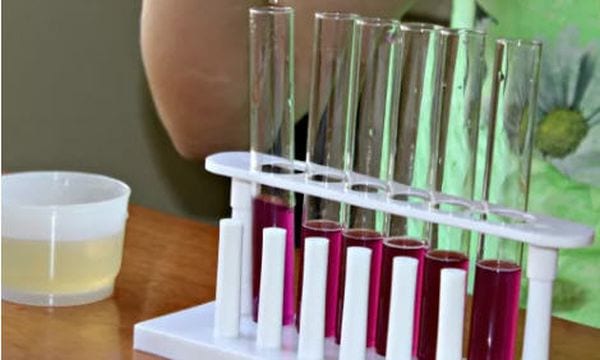
17. Test pH using cabbage
Teach kids about acids and bases without needing pH test strips. Simply boil some red cabbage and use the resulting water to test various substances—acids turn red and bases turn green.
Learn more: Cabbage pH
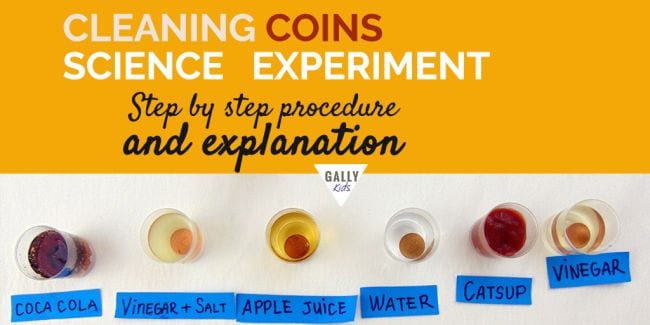
18. Clean some old coins
Use common household items to make old oxidized coins clean and shiny again in this simple chemistry experiment. Ask kids to predict (hypothesize) which will work best, then expand the learning by doing some research to explain the results.
Learn more: Cleaning Coins

19. Pull an egg into a bottle
This classic easy science experiment never fails to delight. Use the power of air pressure to suck a hard-boiled egg into a jar, no hands required.
Learn more: Egg in a Bottle
20. Blow up a balloon without blowing
Chances are good you probably did easy science experiments like this when you were in school. The baking soda and vinegar balloon experiment demonstrates the reactions between acids and bases when you fill a bottle with vinegar and a balloon with baking soda.
Learn more: Baking Soda and Vinegar Balloon (Guide + Printable Reflection Sheet)
21. Assemble a DIY lava lamp
This 1970s trend is back—as an easy science experiment! This activity combines acid-base reactions with density for a totally groovy result.

22. Explore how sugary drinks affect teeth
The calcium content of eggshells makes them a great stand-in for teeth. Use eggs to explore how soda and juice can stain teeth and wear down the enamel. Expand your learning by trying different toothpaste-and-toothbrush combinations to see how effective they are.
Learn more: Sugar and Teeth Experiment
23. Mummify a hot dog
If your kids are fascinated by the Egyptians, they’ll love learning to mummify a hot dog! No need for canopic jars , just grab some baking soda and get started.
24. Extinguish flames with carbon dioxide
This is a fiery twist on acid-base experiments. Light a candle and talk about what fire needs in order to survive. Then, create an acid-base reaction and “pour” the carbon dioxide to extinguish the flame. The CO2 gas acts like a liquid, suffocating the fire.

25. Send secret messages with invisible ink
Turn your kids into secret agents. Write messages with a paintbrush dipped in lemon juice, then hold the paper over a heat source and watch the invisible become visible as oxidation goes to work.
Learn more: Invisible Ink
26. Create dancing popcorn
This is a fun version of the classic baking soda and vinegar experiment, perfect for the younger crowd. The bubbly mixture causes popcorn to dance around in the water.
Learn more: Dancing Popcorn (Guide + Printable Reflection Sheet)
27. Shoot a soda geyser sky-high
You’ve always wondered if this really works, so it’s time to find out for yourself. Kids will marvel at the chemical reaction that sends diet soda shooting high in the air when Mentos are added.
Learn more: Mentos and Coke Experiment (Guide + Printable Reflection Sheet)

28. Send a teabag flying
Hot air rises, and this experiment can prove it. You’ll want to supervise kids with fire, of course. For added safety, try this one outside.
Learn more: Flying Tea Bags
29. Create magic milk
This fun and easy science experiment demonstrates principles related to surface tension, molecular interactions, and fluid dynamics.
Learn more: Magic Milk Experiment (Guide + Printable Reflection Sheet)
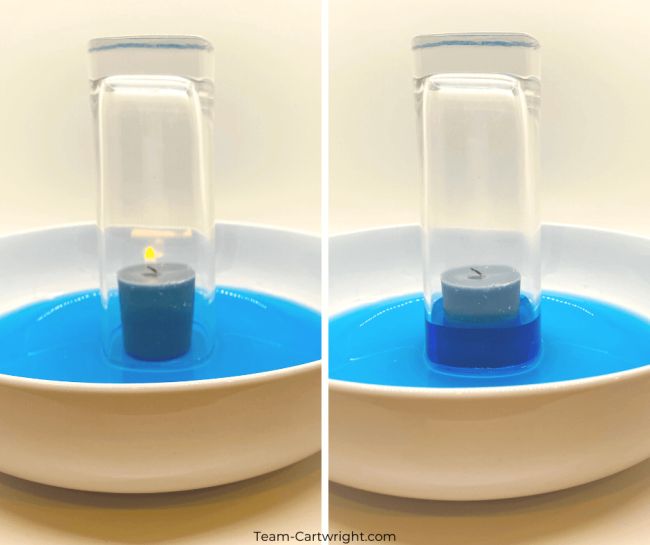
30. Watch the water rise
Learn about Charles’s law with this simple experiment. As the candle burns, using up oxygen and heating the air in the glass, the water rises as if by magic.
Learn more: Rising Water Experiment

31. Learn about capillary action
Kids will be amazed as they watch the colored water move from glass to glass, and you’ll love the easy and inexpensive setup. Gather some water, paper towels, and food coloring to teach the scientific magic of capillary action.
Learn more: Capillary Action
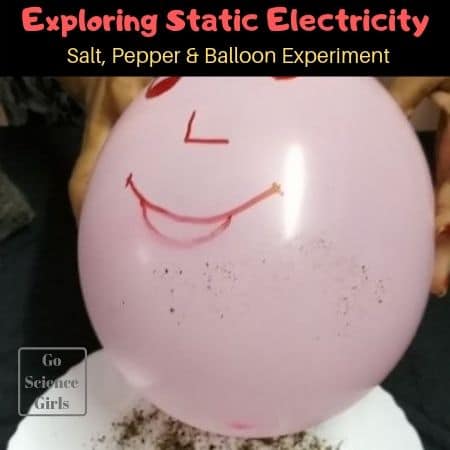
32. Give a balloon a beard
Equally educational and fun, this experiment will teach kids about static electricity using everyday materials. Kids will get a kick out of creating beards on their balloon people!
Learn more: Static Electricity
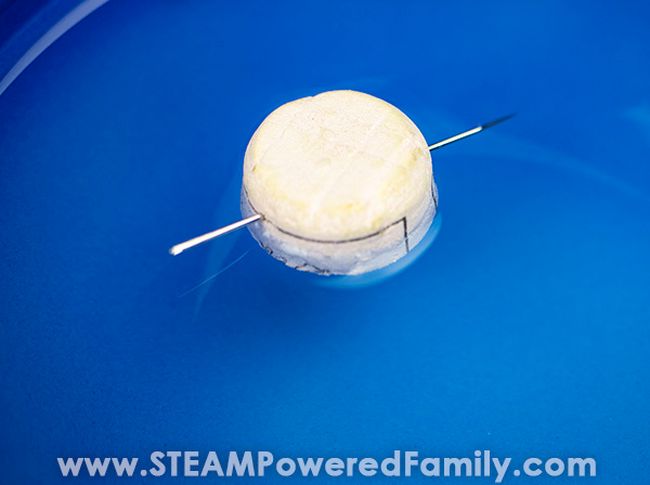
33. Find your way with a DIY compass
Here’s an old classic that never fails to impress. Magnetize a needle, float it on the water’s surface, and it will always point north.
Learn more: How To Make a Compass
34. Crush a can using air pressure
Sure, it’s easy to crush a soda can with your bare hands, but what if you could do it without touching it at all? That’s the power of air pressure!

35. Tell time using the sun
While people use clocks or even phones to tell time today, there was a time when a sundial was the best means to do that. Kids can create their own sundials using everyday materials like cardboard and pencils.
Learn more: Make Your Own Sundial
36. Launch a bottle rocket
Grab a cork, plastic bottle, cardboard, duct tape, and bike pump to learn about the laws of motion.
Learn more: Bottle Rocket (Guide + Printable Reflection Sheet)

37. Make sparks with steel wool
All you need is steel wool and a 9-volt battery to perform this science demo that’s bound to make their eyes light up! Kids learn about chain reactions, chemical changes, and more.
Learn more: Steel Wool Electricity
38. Levitate a Ping-Pong ball
This experiment is really all about Bernoulli’s principle. You only need plastic bottles, bendy straws, and Ping-Pong balls to make the science magic happen.
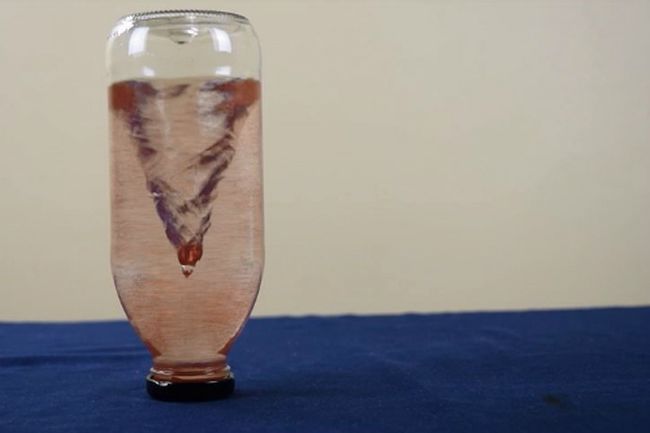
39. Whip up a tornado in a bottle
There are plenty of versions of this classic experiment out there, but we love this one because it sparkles. Kids learn about a vortex and what it takes to create one.
Learn more: Tornado in a Bottle
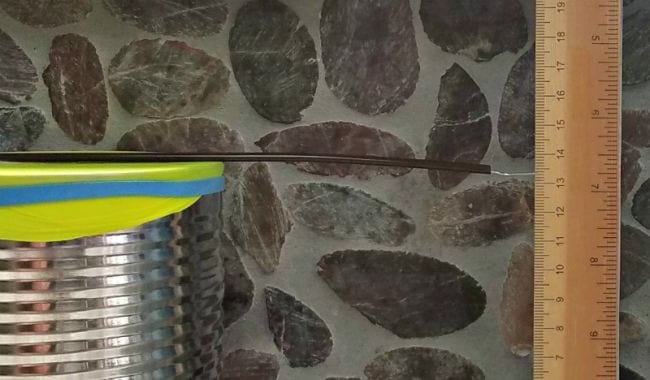
40. Monitor air pressure with a DIY barometer
This simple but effective DIY science project teaches kids about air pressure and meteorology. They’ll have fun tracking and predicting the weather with their very own barometer.
Learn more: How To Make a Barometer
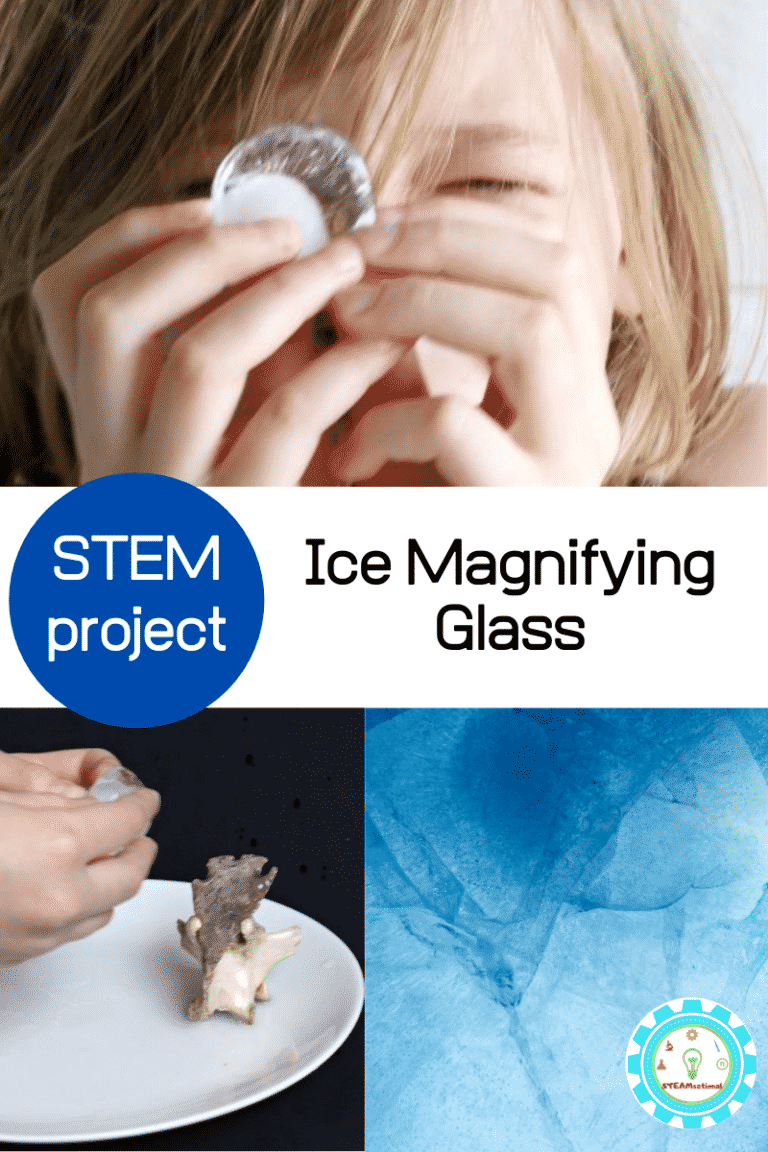
41. Peer through an ice magnifying glass
Students will certainly get a thrill out of seeing how an everyday object like a piece of ice can be used as a magnifying glass. Be sure to use purified or distilled water since tap water will have impurities in it that will cause distortion.
Learn more: Ice Magnifying Glass

42. String up some sticky ice
Can you lift an ice cube using just a piece of string? This quick experiment teaches you how. Use a little salt to melt the ice and then refreeze the ice with the string attached.
Learn more: Sticky Ice
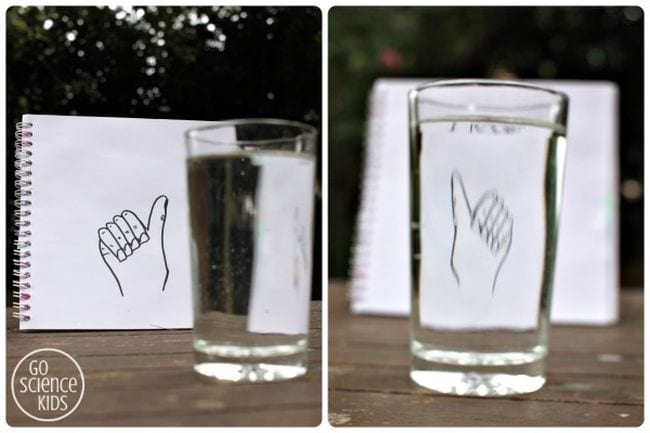
43. “Flip” a drawing with water
Light refraction causes some really cool effects, and there are multiple easy science experiments you can do with it. This one uses refraction to “flip” a drawing; you can also try the famous “disappearing penny” trick .
Learn more: Light Refraction With Water
44. Color some flowers
We love how simple this project is to re-create since all you’ll need are some white carnations, food coloring, glasses, and water. The end result is just so beautiful!
45. Use glitter to fight germs
Everyone knows that glitter is just like germs—it gets everywhere and is so hard to get rid of! Use that to your advantage and show kids how soap fights glitter and germs.
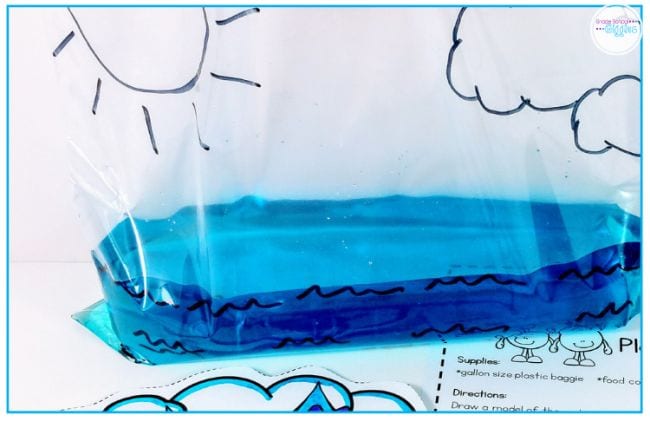
46. Re-create the water cycle in a bag
You can do so many easy science experiments with a simple zip-top bag. Fill one partway with water and set it on a sunny windowsill to see how the water evaporates up and eventually “rains” down.
Learn more: Water Cycle in a Bag and Water Cycle Lesson Slides and Video
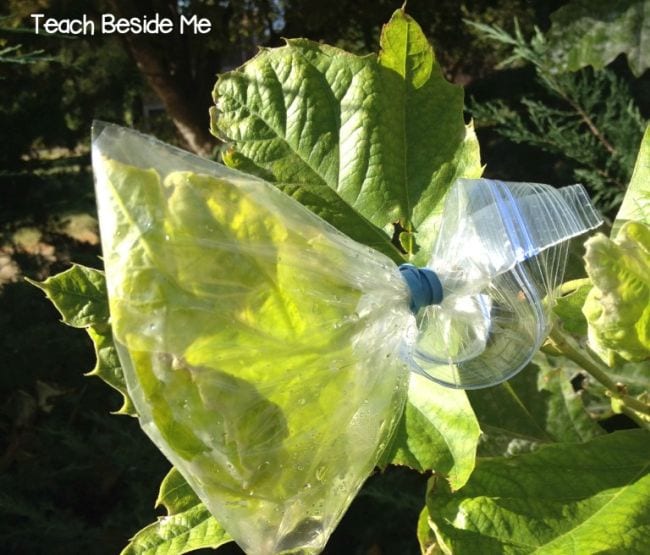
47. Learn about plant transpiration
Your backyard is a terrific place for easy science experiments. Grab a plastic bag and rubber band to learn how plants get rid of excess water they don’t need, a process known as transpiration.
Learn more: Plant Transpiration
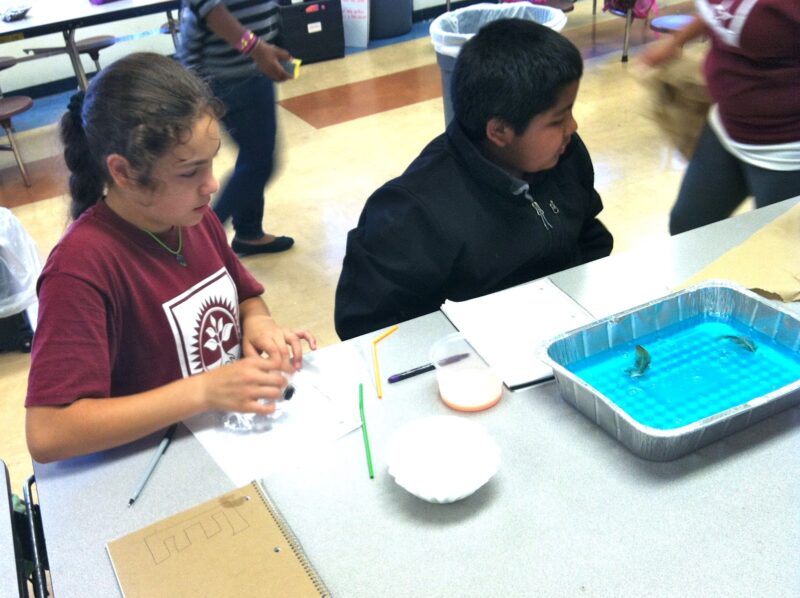
48. Clean up an oil spill
Before conducting this experiment, teach your students about engineers who solve environmental problems like oil spills. Then, have your students use provided materials to clean the oil spill from their oceans.
Learn more: Oil Spill

49. Construct a pair of model lungs
Kids get a better understanding of the respiratory system when they build model lungs using a plastic water bottle and some balloons. You can modify the experiment to demonstrate the effects of smoking too.
Learn more: Lung Science Experiment
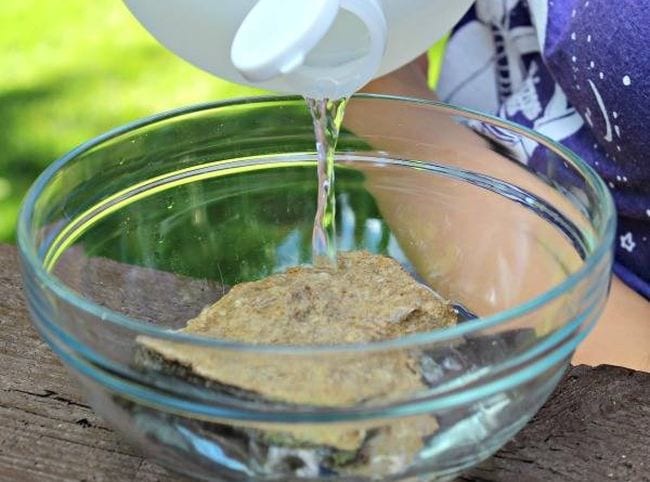
50. Experiment with limestone rocks
Kids love to collect rocks, and there are plenty of easy science experiments you can do with them. In this one, pour vinegar over a rock to see if it bubbles. If it does, you’ve found limestone!
Learn more: Limestone Experiments
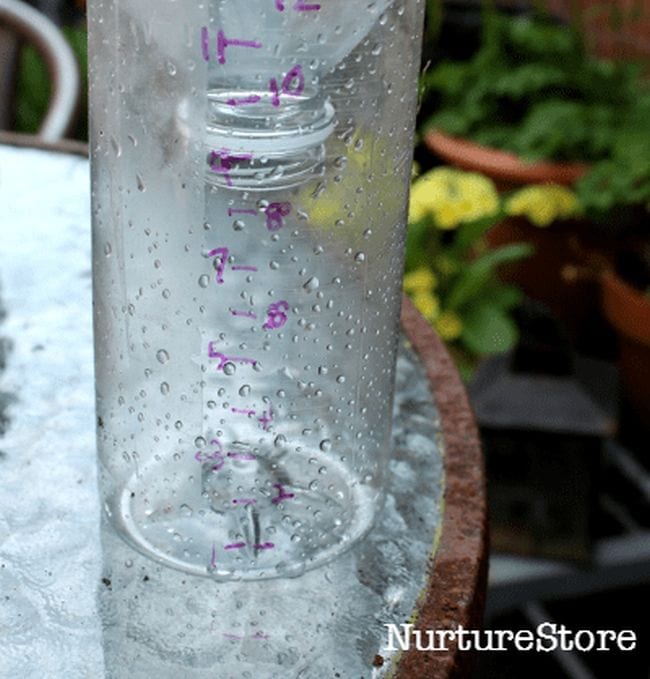
51. Turn a bottle into a rain gauge
All you need is a plastic bottle, a ruler, and a permanent marker to make your own rain gauge. Monitor your measurements and see how they stack up against meteorology reports in your area.
Learn more: How To Make a Rain Gauge

52. Build up towel mountains
This clever demonstration helps kids understand how some landforms are created. Use layers of towels to represent rock layers and boxes for continents. Then pu-u-u-sh and see what happens!
Learn more: Towel Mountains
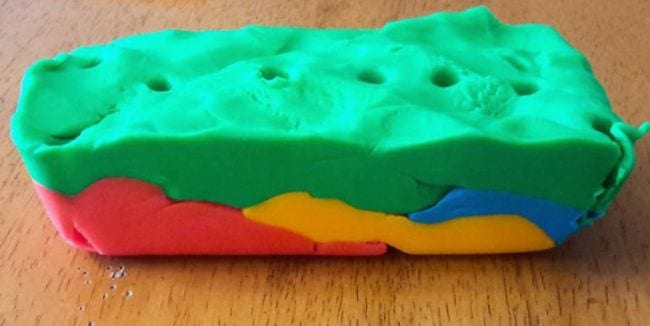
53. Take a play dough core sample
Learn about the layers of the earth by building them out of play dough, then take a core sample with a straw. ( Love Play-Doh? Get more learning ideas here. )
Learn more: Play Dough Core Sampling
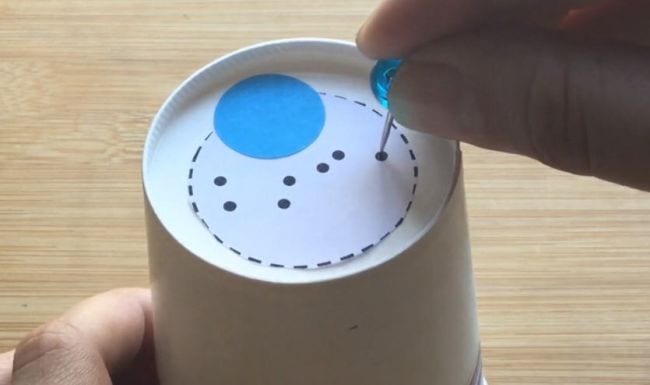
54. Project the stars on your ceiling
Use the video lesson in the link below to learn why stars are only visible at night. Then create a DIY star projector to explore the concept hands-on.
Learn more: DIY Star Projector

55. Make it rain
Use shaving cream and food coloring to simulate clouds and rain. This is an easy science experiment little ones will beg to do over and over.
Learn more: Shaving Cream Rain
56. Blow up your fingerprint
This is such a cool (and easy!) way to look at fingerprint patterns. Inflate a balloon a bit, use some ink to put a fingerprint on it, then blow it up big to see your fingerprint in detail.
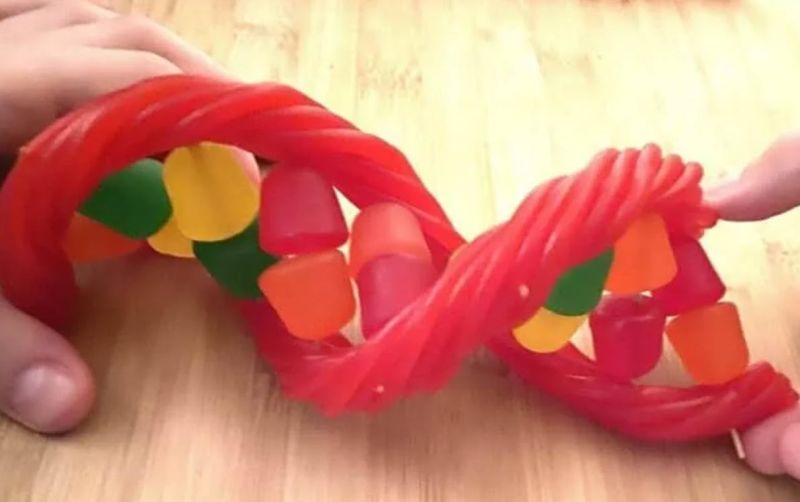
57. Snack on a DNA model
Twizzlers, gumdrops, and a few toothpicks are all you need to make this super-fun (and yummy!) DNA model.
Learn more: Edible DNA Model
58. Dissect a flower
Take a nature walk and find a flower or two. Then bring them home and take them apart to discover all the different parts of flowers.

59. Craft smartphone speakers
No Bluetooth speaker? No problem! Put together your own from paper cups and toilet paper tubes.
Learn more: Smartphone Speakers
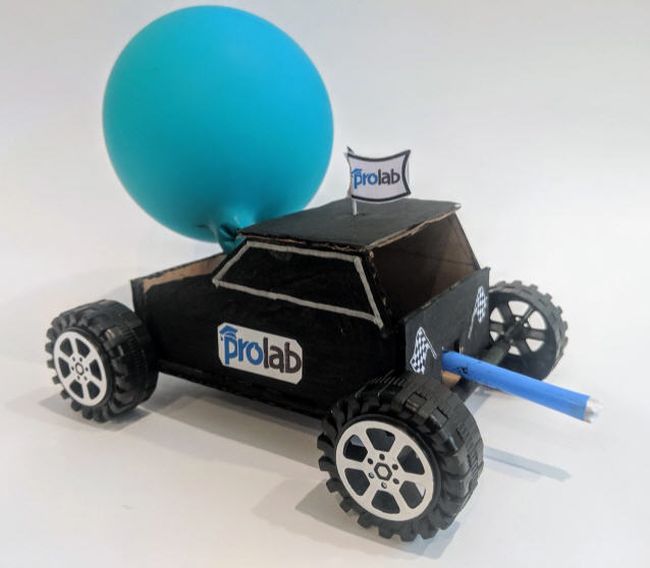
60. Race a balloon-powered car
Kids will be amazed when they learn they can put together this awesome racer using cardboard and bottle-cap wheels. The balloon-powered “engine” is so much fun too.
Learn more: Balloon-Powered Car

61. Build a Ferris wheel
You’ve probably ridden on a Ferris wheel, but can you build one? Stock up on wood craft sticks and find out! Play around with different designs to see which one works best.
Learn more: Craft Stick Ferris Wheel
62. Design a phone stand
There are lots of ways to craft a DIY phone stand, which makes this a perfect creative-thinking STEM challenge.
63. Conduct an egg drop
Put all their engineering skills to the test with an egg drop! Challenge kids to build a container from stuff they find around the house that will protect an egg from a long fall (this is especially fun to do from upper-story windows).
Learn more: Egg Drop Challenge Ideas
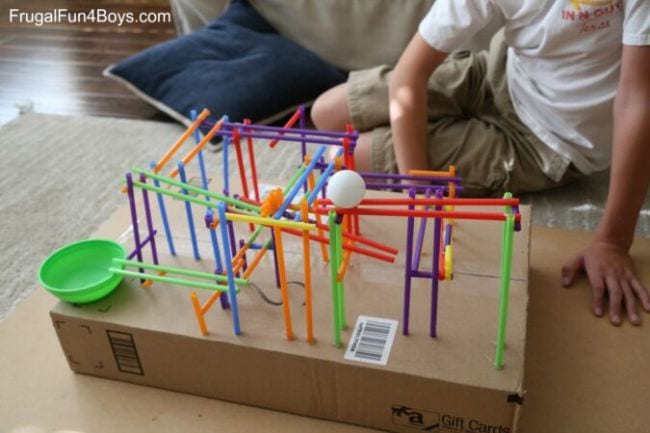
64. Engineer a drinking-straw roller coaster
STEM challenges are always a hit with kids. We love this one, which only requires basic supplies like drinking straws.
Learn more: Straw Roller Coaster
65. Build a solar oven
Explore the power of the sun when you build your own solar ovens and use them to cook some yummy treats. This experiment takes a little more time and effort, but the results are always impressive. The link below has complete instructions.
Learn more: Solar Oven (Guide + Printable Reflection Sheet)

66. Build a Da Vinci bridge
There are plenty of bridge-building experiments out there, but this one is unique. It’s inspired by Leonardo da Vinci’s 500-year-old self-supporting wooden bridge. Learn how to build it at the link, and expand your learning by exploring more about Da Vinci himself.
Learn more: Da Vinci Bridge
67. Step through an index card
This is one easy science experiment that never fails to astonish. With carefully placed scissor cuts on an index card, you can make a loop large enough to fit a (small) human body through! Kids will be wowed as they learn about surface area.

68. Stand on a pile of paper cups
Combine physics and engineering and challenge kids to create a paper cup structure that can support their weight. This is a cool project for aspiring architects.
Learn more: Paper Cup Stack

69. Test out parachutes
Gather a variety of materials (try tissues, handkerchiefs, plastic bags, etc.) and see which ones make the best parachutes. You can also find out how they’re affected by windy days or find out which ones work in the rain.
Learn more: How To Make a Parachute

70. Recycle newspapers into an engineering challenge
It’s amazing how a stack of newspapers can spark such creative engineering. Challenge kids to build a tower, support a book, or even build a chair using only newspaper and tape!
Learn more: Newspaper STEM Challenge

71. Use rubber bands to sound out acoustics
Explore the ways that sound waves are affected by what’s around them using a simple rubber-band “guitar.” (Kids absolutely love playing with these!)
Learn more: Sound Experiment
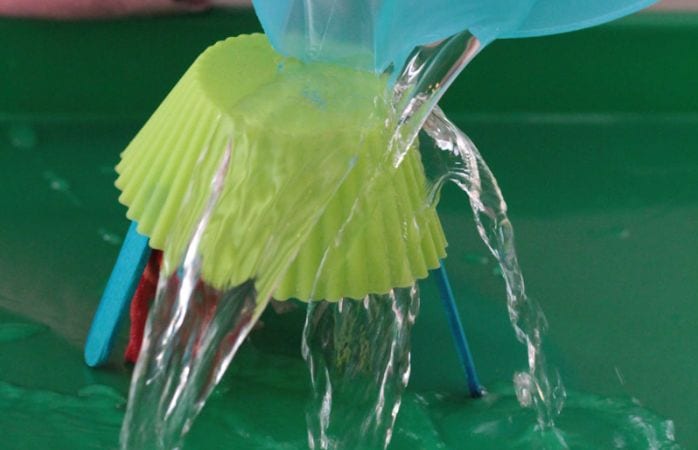
72. Assemble a better umbrella
Challenge students to engineer the best possible umbrella from various household supplies. Encourage them to plan, draw blueprints, and test their creations using the scientific method.
Learn more: Umbrella STEM Challenge
73. Grow rock candy
Turn science into a sweet treat by making rock candy. Dissolve sugar in hot water to create a solution, then let it cool as crystals slowly form on a stick or string. The best part is that the kids get to eat their experiment when it’s done!
74. Create a rain cloud in a jar
Bring weather science indoors with this fun hands-on project. Use shaving cream to mimic clouds and add drops of food coloring to simulate rain. It’s a great way to explore the water cycle without even having to step outside!
75. Brighten up with rainbow celery
Make your science lesson more vibrant with a splash of color. Drop celery stalks into glasses of water with food dye, and watch as the beautiful colors travel up through the stems.
76. Safely view a solar eclipse
Teach your students about the solar eclipse, and help them safely view this exciting event with just a few simple materials.
Learn more: Solar Eclipse Viewer (Guide + Printable Reflection Sheet)
Get your free printable science experiment recording sheet!
Just fill out the form on this page to get instant access to your free printable experiment recording sheet.
Plus, visit our science hub for everything science for grades K-12!
Sign up for our newsletters to get all the latest learning ideas straight to your inbox., you might also like.
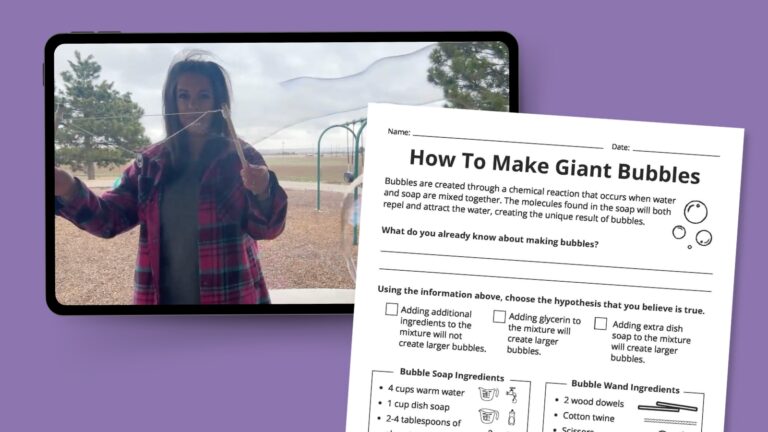
Giant Bubbles Experiment: How-To Plus Free Worksheet
It'll blow everyone away! Continue Reading
Copyright © 2024. All rights reserved. 5335 Gate Parkway, Jacksonville, FL 32256

Top 100 Experimental Research Topics for School & College Students
Top 100 Experimental Research Topics for School & College Students: Are you a student looking for inspiration for your next research project? Research is a vital aspect of your educational journey, and choosing the right topic is often the first step to success. Whether you’re in school or college, finding a compelling experimental research topic can be a daunting task. But fear not! We’ve compiled a list of the top 100 experimental research topics to ignite your curiosity and help you embark on an exciting research journey.
What is Experimental Research?
Experimental research is a research approach that entails the deliberate manipulation of one or more independent variables to assess their impact on one or more dependent variables. It is widely regarded as the “gold standard” of research methodologies due to its capacity to establish causal relationships between variables.
Typically, experimental research designs involve the creation of two distinct groups: the experimental group and the control group. The experimental group is exposed to the independent variable, while the control group is not. Subsequently, the researcher compares the outcomes of these two groups to identify any disparities.
Two primary categories of experimental research designs exist: true experiments and quasi-experiments. True experiments employ random assignment of participants to the experimental and control groups, ensuring initial equivalency between the groups and minimizing alternative explanations for observed differences.
Conversely, quasi-experiments lack random assignment, potentially introducing disparities between the experimental and control groups at the outset, which may confound the results. Nevertheless, quasi-experiments can still be valuable in studying cause-and-effect relationships, particularly when random assignment is impractical or ethically challenging.
Experimental research finds applications across diverse fields such as science, medicine, education, and business. It serves as a potent tool for comprehending how various factors influence outcomes and for developing novel products and interventions.
Consider the following examples of experimental research :
A scientist aims to assess a new drug’s effectiveness in treating high blood pressure. Participants are randomly assigned to receive either the new drug or a placebo. After several weeks, their blood pressure is measured, and the results between the two groups are compared.
A teacher seeks to investigate the impact of various teaching methods on student achievement. Students are randomly allocated to different classrooms, each utilizing a distinct teaching method. At the end of the semester, the students’ test scores are compared to identify the most effective teaching method.
A marketing manager intends to evaluate the influence of a new advertising campaign on product sales. A random sample of customers is chosen and assigned to either view the new advertising campaign or not. After several weeks, sales data from the two groups are compared to determine the campaign’s effectiveness.
Major Types of Experimental Research Design
There are three main types of experimental research designs:
1. Pre-experimental research designs
Pre-experimental research designs are the simplest type of experimental design. They do not involve random assignment, and the researcher typically only tests one group of participants. Pre-experimental research designs are often used to generate preliminary data or to explore new research questions. However, they are not considered to be as rigorous as other types of experimental designs because they are more prone to confounding variables.
Here are some examples of pre-experimental research designs:
- One-shot case study design: The researcher tests a single group of participants after they have been exposed to the independent variable.
- One-group pretest-posttest design: The researcher tests a single group of participants before and after they have been exposed to the independent variable.
- Static-group comparison design: The researcher compares two groups of participants, one of which has been exposed to the independent variable and the other of which has not.
2. Quasi-experimental research designs
Quasi-experimental research designs are more rigorous than pre-experimental research designs because they involve some form of control group. However, they do not involve random assignment. Quasi-experimental research designs are often used in situations where random assignment is not feasible or ethical.
Here are some examples of quasi-experimental research designs:
- Non-equivalent control group design: The researcher compares two groups of participants, one of which has been exposed to the independent variable and the other of which has not. The two groups are not randomly assigned, but the researcher tries to match them on relevant characteristics to reduce the risk of confounding variables.
- Time series design: The researcher tests a single group of participants multiple times over time, both before and after they have been exposed to the independent variable.
- Interrupted time series design: The researcher tests a single group of participants multiple times over time, both before and after they have been exposed to the independent variable. However, there is an interruption in the time series, such as a change in policy or practice, that may affect the dependent variable.
3. True experimental research designs
True experimental research designs are the most rigorous type of experimental design. They involve random assignment and a control group. True experimental research designs are considered to be the best way to establish cause-and-effect relationships between variables.
Here are some examples of true experimental research designs:
- Randomized controlled trial (RCT): The researcher randomly assigns participants to either the experimental group or the control group. The experimental group is exposed to the independent variable, while the control group is not. The researcher then compares the outcomes of the two groups to see if there is a difference.
- Posttest-only control group design: The researcher randomly assigns participants to either the experimental group or the control group. The experimental group is exposed to the independent variable, while the control group is not. The researcher then measures the dependent variable in both groups after the experiment is complete.
- Solomon four-group design: This design is similar to the posttest-only control group design, but it also includes two additional groups: a pretest-posttest experimental group and a pretest-posttest control group. This allows the researcher to control for the effects of testing.
Experimental research is a powerful tool for understanding the world around us and developing new ways to improve our lives. By understanding the different types of experimental research designs, we can better evaluate the quality of research and make informed decisions about the findings.
Elements of Experimental Research
Experimental research typically comprises several essential elements that help structure and conduct a rigorous scientific investigation. These elements are crucial for designing, executing, and analyzing experiments effectively. Here are the key elements of experimental research:
- Research Question or Hypothesis : Every experiment begins with a clear research question or a testable hypothesis. This question or hypothesis specifies what the researcher aims to investigate or the relationship they seek to explore.
- Independent Variable : The independent variable is the factor that the researcher intentionally manipulates or varies in the experiment. It is the presumed cause and is under the researcher’s control. In some cases, there may be more than one independent variable.
- Dependent Variable : The dependent variable is the outcome or response that the researcher measures or observes. It is the variable that may be influenced by changes in the independent variable. The dependent variable is what researchers are trying to understand or explain.
- Experimental and Control Groups : To assess the impact of the independent variable, participants or subjects are typically divided into at least two groups: the experimental group and the control group. The experimental group is exposed to the independent variable, while the control group is not. This comparison helps determine whether any observed effects are due to the manipulation of the independent variable.
- Random Assignment : In true experimental designs, participants are randomly assigned to the experimental and control groups. Random assignment helps ensure that the groups are comparable and minimizes bias, increasing the internal validity of the experiment.
- Controlled Conditions : Experimental research strives to control and minimize the influence of extraneous variables, which are factors other than the independent variable that could affect the results. This control helps isolate the effects of the independent variable.
- Experimental Procedure : Researchers outline the specific steps and procedures that participants will undergo during the experiment. This includes how the independent variable will be manipulated, how data will be collected, and the sequence of events.
- Data Collection : Data collection involves gathering information about the dependent variable’s responses or outcomes. This is typically done through measurements, observations, surveys, or other data collection methods.
- Data Analysis : After data collection, researchers analyze the collected data using statistical methods to determine whether there are significant differences or relationships between groups. This analysis helps draw conclusions about the impact of the independent variable on the dependent variable.
- Replication : To enhance the reliability of experimental findings, replication involves repeating the experiment under similar conditions to see if the results can be consistently reproduced.
- Ethical Considerations : Researchers must adhere to ethical principles when conducting experiments involving human or animal subjects. This includes obtaining informed consent, ensuring participant well-being, and minimizing harm.
- Reporting and Communication : Researchers communicate their findings by writing research papers or reports that describe the experiment, its methods, results, and conclusions. This enables other scientists to assess and build upon the research.
These elements collectively form the foundation of experimental research, allowing researchers to systematically investigate and establish cause-and-effect relationships between variables in a controlled and methodical manner.
Top Best Experimental Research Topics for School Students
Natural sciences research topics for school students:.
- Investigating How Light Intensity Affects Plant Growth
- Exploring the Relationship Between Salt Concentrations and the Freezing Point of Water
- Comparing Battery Lifespan Among Various Brands
- Studying the Influence of pH on Enzyme Activity
- Examining the Effect of Magnet Strength on the Attraction Distance of a Paperclip
Behavioral Sciences Research Topics for School Students:
- Analyzing the Impact of Music on Concentration
- Contrasting Group Study and Individual Study to Assess Their Effects on Academic Performance
- Investigating the Influence of Reward Systems on Student Motivation
- Exploring the Role of Different Colors in Shaping Mood
- Assessing How Sleep Patterns Affect Academic Performance
Environmental Studies Research Topics for School Students:
- Investigating How Temperature Affects Composting Processes
- Assessing the Consequences of Water Pollution on Aquatic Life
- Exploring the Impact of Urbanization on Local Bird Species
- Studying the Influence of Different Soil Types on Plant Growth
- Examining the Effects of Acid Rain on Plant Growth
Best Experimental Research Topics for College Students
Social sciences research topics for college students:.
- Examining the Relationship Between Socioeconomic Status and Mental Health
- Analyzing the Influence of Media Portrayals on Body Image
- Investigating the Effects of Bilingual Education on Academic Achievement
- Exploring the Role of Social Media in Political Campaigns
- Assessing the Impact of Gender Stereotypes on Career Choices
Business and Economics:
- Evaluating the Influence of Online Reviews on Consumer Purchasing Decisions
- The Effect of Advertising on Brand Loyalty
- Analyzing the Impact of Corporate Social Responsibility on Profitability
- The Efficacy of Different Pricing Strategies on Sales
- Investigating the Relationship Between Employee Satisfaction and Productivity
- Effects of Economic Policy Changes on Small Businesses
- The Role of Market Research in Product Development
- The Impact of Globalization on International Trade
- Comparing the Performance of Different Investment Strategies
- Evaluating the Effects of Tax Policies on Economic Growth
Natural Sciences Research Topics for College Students:
- Investigating the Genetic Factors Contributing to Obesity
- Analyzing the Effects of Climate Change on Marine Ecosystems
- Assessing the Impact of Pesticides on Bee Populations
- Studying the Consequences of Pollution on Urban Wildlife
- Examining the Role of Microplastics in Freshwater Ecosystems
Applied Sciences Research Topics for College Students:
- Evaluating the Effectiveness of Machine Learning Algorithms in Predicting Stock Prices
- Analyzing the Significance of Encryption in Ensuring Data Security
- Investigating the Influence of Aerodynamics on Vehicle Fuel Efficiency
- Assessing the Impact of Material Properties on Bridge Stability
- Studying the Efficiency of Solar Panels at Different Angles
Health Sciences Research Topics for College Students:
- Investigating the Role of Exercise in the Management of Type 2 Diabetes
- Analyzing the Effects of Caffeine on Cognitive Performance
- Assessing the Impact of Plant-Based Diets on Heart Health
- Evaluating the Effectiveness of Various Physical Therapy Methods in Knee Rehabilitation
- Studying the Role of Mindfulness Meditation in Reducing Stress
Environmental Sciences Research Topics for College Students:
- Examining the Consequences of Deforestation on Local Climate Patterns
- Investigating the Efficacy of Different Oil Spill Cleanup Techniques
- Analyzing the Effects of Organic Farming on Crop Yield
- Assessing the Impact of Noise Pollution on Urban Wildlife
- Examining the Influence of Electronic Waste (E-Waste) on Soil Quality
Computer Sciences Research Topics for College Students:
- Comparing Various Sorting Algorithms for Efficiency
- Evaluating the Security Implications of Different Password Policies
- Analyzing the Impact of User Interface Design on User Experience
- Investigating the Role of Artificial Intelligence in Image Recognition
- Assessing the Energy Efficiency of Different Computer Processors
Economics Research Topics for College Students:
- Examining the Effects of Economic Policies on Inflation
- Analyzing the Role of Microfinance in Alleviating Poverty
- Assessing the Impact of Globalization on Small Businesses
- Investigating the Influence of Exchange Rates on the Export Market
- Evaluating the Relationship Between Unemployment and Crime Rates
Tips for Selecting an Appropriate Experimental Research Topic
Choosing the right topic is fundamental to the success of an experimental research project. Here are some valuable tips to assist students in this selection process:
- Interest : Opt for a topic that genuinely piques your interest. Your passion for the subject will serve as a motivating force throughout the research journey.
- Relevance : Pick a topic that aligns with your field of study. It should complement your academic objectives and enrich your comprehension of the subject matter.
- Feasibility : Ensure that the chosen topic is practical and feasible for research. Consider factors such as resource availability, time constraints, and ethical considerations.
- Uniqueness : Choose a topic that is original and distinctive. This not only enhances the appeal of your research but also contributes to the advancement of your academic field.
Conclusion: 100 Experimental Research Topics for Students
Experimental research is a pivotal component of scientific exploration. It empowers us to establish causal relationships, expand our comprehension of the world, and discover solutions to issues across diverse fields of study.
Engaging in an experimental research project can be a gratifying experience. It enables students to apply their knowledge, cultivate critical thinking and problem-solving skills, and make meaningful contributions to their academic discipline.


300+ Best Experimental Research Topics For Stem Students
Have you ever wondered why experimental research is so important in STEM fields? Experimental research is essential in science, technology, engineering, and mathematics because it allows students to ask questions, test ideas, and discover new facts.
According to the National Science Foundation, hands-on experiences significantly improve understanding of scientific concepts. When students engage in experiments, they learn to think critically and solve problems. This not only deepens their knowledge but also builds skills needed for real-world applications.
Experimental research encourages curiosity and creativity, making learning more engaging. It gives students the opportunity to see how theories work in practice, enhancing their appreciation for the subject matter.
By actively participating in experiments, students can better grasp complex ideas and develop a passion for STEM fields. This practical approach to learning prepares them for future challenges and inspires them to innovate.
Table of Contents
Experimental Research Topics For Stem Students PDF
What is experimental research.
Experimental research is a scientific method used to test hypotheses by manipulating variables in a controlled environment. It involves comparing outcomes between a group that receives an intervention (the experimental group) and a group that does not (the control group). The main goal is to determine cause-and-effect relationships.
Key Characteristics For Experimental Research
- Control : Researchers control the environment to eliminate outside influences.
- Manipulation : One or more independent variables are changed to observe effects on dependent variables.
- Random Assignment : Participants are randomly assigned to groups to ensure that differences are due to the intervention, not pre-existing factors.
- Replication : The study can be repeated to confirm findings.
- Measurement : Outcomes are measured quantitatively to allow for statistical analysis.
Differences Between Experimental and Observational Research
Here’s a table comparing experimental and observational research:
Benefits for Experimental Research Topics For Stem Students
These are the most important benefits of experimental research topics for stem students:
- Hands-On Learning : Students get to work directly with experiments, making learning more practical and engaging.
- Skill Development : They gain important skills in designing experiments, collecting data, and analyzing results.
- Problem-Solving : Experimental research helps students develop critical thinking and problem-solving skills.
- Creativity : It encourages creative thinking as students design their experiments and explore new ideas.
- Teamwork : Many experiments are done in groups, helping students learn to work together and communicate effectively.
Contribution to Scientific Knowledge and Innovation
- Advancing Science : Experimental research helps uncover new facts and ideas in science.
- Real-World Applications : Results can lead to practical solutions in technology, healthcare, and the environment.
- Informed Decisions : The data from experiments can guide important choices in policy and industry.
- Fostering Innovation : Exploring new questions can lead to breakthroughs and fresh inventions.
- Building Knowledge : Findings contribute to the scientific community, allowing others to build on previous research.
What Are Some Experimental Research Topics For Senior Hs Stem Students?
Here are some experimental research topics suitable for senior high school STEM students:
- Effects of Different Fertilizers on Plant Growth : Compare the growth of plants using organic vs. chemical fertilizers.
- Impact of Light Color on Photosynthesis : Investigate how different colors of light affect the rate of photosynthesis in plants.
- Antibiotic Resistance in Bacteria : Test the effectiveness of various antibiotics on bacterial growth.
- Influence of Temperature on Yeast Fermentation : Study how temperature affects the rate of fermentation in yeast.
- The Effect of pH on Enzyme Activity : Examine how different pH levels impact the effectiveness of an enzyme.
- Reaction Rates of Baking Soda and Vinegar : Investigate how changing the concentration of vinegar affects the reaction rate.
- Impact of Temperature on Solubility : Explore how temperature influences the solubility of salt in water.
- Creating Biodegradable Plastics : Experiment with different natural materials to create eco-friendly plastic alternatives.
- Effects of Acids on Metal Corrosion : Study how different acids affect the rate of rusting in various metals.
- Color Change in pH Indicators : Test how various household substances change the color of pH indicators.
- Investigating the Laws of Motion with Balloons : Test how varying amounts of air in balloons affect distance traveled.
- The Effect of Mass on Pendulum Swing : Explore how different weights affect the swing time of a pendulum.
- Sound Wave Behavior in Different Materials : Measure how sound travels through solids, liquids, and gases.
- Investigating the Relationship Between Voltage and Current : Create a circuit to study Ohm’s Law using different resistors.
- The Impact of Friction on Sliding Objects : Compare how different surfaces affect the distance a toy car travels.
Environmental Science
- The Effect of Urbanization on Local Wildlife : Study how urban development affects the diversity of local species.
- Water Filtration Methods : Experiment with different materials to create a homemade water filter.
- Comparing Renewable Energy Sources : Test the efficiency of solar panels vs. wind turbines using small models.
- The Impact of Plastic Waste on Soil Quality : Investigate how different types of plastic affect soil health.
- Effectiveness of Natural Pesticides : Compare the impact of chemical vs. natural pesticides on pest control in plants.
Health Sciences
- Impact of Exercise on Heart Rate Recovery : Measure how long it takes for heart rate to return to normal after different types of exercise.
- Effects of Screen Time on Concentration : Study how different durations of screen time affect students’ ability to focus on tasks.
- The Relationship Between Sleep and Academic Performance : Conduct surveys and analyze the correlation between sleep patterns and grades.
- Influence of Music on Study Habits : Test whether listening to different types of music affects students’ study effectiveness.
- The Impact of Nutrition on Mood : Investigate how different diets affect mood and energy levels.
Experimental Research Topics For Stem Students
Here are some of the best experiemental research topics for STEM students:
- Effects of temperature on how enzymes work.
- How soil pH affects plant growth.
- Studying antibiotic resistance in bacteria.
- Impact of pollution on fish and other aquatic life.
- Role of genetic engineering in farming.
- Behavior of microorganisms in extreme conditions.
- Effects of sunlight on photosynthesis.
- How different fertilizers impact crop yield.
- Genetic diversity in local plant species.
- Connection between biodiversity and ecosystem health.
- How climate change affects wildlife.
- The role of bees in pollination.
- Effects of deforestation on animal habitats.
- Studying the impact of climate change on migration patterns.
- The relationship between diet and gut bacteria.
- How invasive species affect local ecosystems.
- The impact of urbanization on local wildlife.
- Effects of heavy metals on plant growth.
- The importance of wetlands for biodiversity.
- Investigating plant responses to drought.
- How temperature affects chemical reactions.
- Studying the properties of biodegradable plastics.
- Analyzing water quality in rivers.
- The effect of acid rain on plants.
- How different catalysts speed up reactions.
- Exploring the chemistry behind natural dyes.
- The role of salt in food preservation.
- Investigating the effects of household chemicals on health.
- The relationship between structure and function in molecules.
- Studying the impact of detergents on water quality.
- Analyzing the effectiveness of natural cleaning products.
- The chemistry of essential oils and their uses.
- Investigating the effects of different acids on metal.
- The role of antioxidants in preventing oxidation.
- Studying chemical reactions in everyday life.
- The impact of temperature on gas solubility.
- Exploring renewable energy sources like biofuels.
- Analyzing food additives and their effects.
- The chemistry of fermentation in food production.
- How chemical reactions are affected by pressure.
- The principles of magnetism and its applications.
- Studying the effects of friction on motion.
- The behavior of pendulums in different conditions.
- How heat transfer works in different materials.
- The relationship between pressure and volume in gases.
- Investigating renewable energy technologies like wind power.
- The impact of sound waves on various materials.
- Studying the motion of projectiles.
- Analyzing the properties of light through prisms.
- The effect of mass on acceleration of falling objects.
- Investigating thermal conductivity in different substances.
- The science behind solar panels and their efficiency.
- Exploring the physics of roller coasters.
- How electrical circuits work in everyday devices.
- Studying the effects of forces on structures.
- The relationship between frequency and wavelength in waves.
- Investigating how levers work in simple machines.
- The principles of energy conservation in physics.
- Exploring fluid dynamics in everyday situations.
- Analyzing the forces at play in sports like basketball.
- The impact of deforestation on ecosystems.
- Investigating renewable energy sources and their benefits.
- How climate change affects animal migration.
- Analyzing soil erosion in agricultural areas.
- The effects of urbanization on air quality.
- Exploring the benefits of recycling programs.
- The impact of plastic waste on marine life.
- Studying the role of wetlands in flood control.
- How agriculture affects local ecosystems.
- Investigating the effectiveness of conservation efforts.
- The relationship between biodiversity and ecosystem stability.
- Analyzing the effects of urban heat islands.
- Exploring the benefits of community gardens.
- The impact of invasive plant species on local environments.
- Studying the role of trees in urban areas.
- Investigating the effects of industrial waste on water.
- Analyzing the impact of global warming on weather patterns.
- The role of education in promoting sustainability.
- Investigating methods of reducing carbon footprints.
- The effects of noise pollution on wildlife.
Computer Science
- Creating algorithms for data sorting.
- The impact of artificial intelligence on jobs.
- Analyzing security in online transactions.
- Exploring machine learning applications in healthcare.
- Studying user behavior in mobile applications.
- The effects of social media on communication.
- Developing a data visualization tool.
- Investigating network security vulnerabilities.
- The importance of big data in business.
- Exploring virtual reality in education.
- Analyzing the effectiveness of video games for learning.
- The role of coding in modern technology.
- Investigating the ethics of data collection.
- Exploring the relationship between technology and privacy.
- The impact of smartphones on daily life.
- Studying cloud computing and its benefits.
- Investigating programming languages and their uses.
- The role of technology in smart cities.
- Analyzing the future of automation in industries.
- Exploring cybersecurity measures for businesses.
Mathematics
- Investigating patterns in the Fibonacci sequence.
- Analyzing statistical trends in sports.
- The role of geometry in architecture.
- Exploring mathematical concepts in nature.
- Studying probability in games of chance.
- The impact of statistics in public health.
- Investigating the use of math in financial planning.
- Exploring fractals and their applications.
- Analyzing the math behind algorithms.
- The relationship between math and music.
- Investigating geometric shapes in art.
- The role of math in computer graphics.
- Exploring calculus in real-life situations.
- Analyzing data from surveys and polls.
- Investigating the concept of infinity.
- Studying the effects of interest rates on savings.
- The role of math in engineering design.
- Analyzing mathematical models for predicting weather.
- Exploring the importance of math in daily life.
- Investigating how math is used in sports statistics.
Engineering
- Designing and testing model bridges.
- Investigating wind turbine efficiency.
- Exploring renewable energy in building design.
- Analyzing the materials used in solar panels.
- The role of engineering in sustainable development.
- Studying the impact of technology on transportation.
- Investigating robotics in manufacturing.
- Analyzing the principles of 3D printing.
- Exploring smart home technology.
- The importance of structural engineering in construction.
- Investigating water filtration systems.
- Designing prototypes for new inventions.
- The role of engineering in disaster management.
- Analyzing the effectiveness of traffic management systems.
- Exploring innovations in agricultural engineering.
- Investigating how engineering can help in climate change.
- The impact of electrical engineering on daily life.
- Exploring aerospace engineering and its challenges.
- Investigating the future of nanotechnology.
- The role of civil engineering in urban planning.
- The impact of diet on heart health.
- Investigating exercise and mental well-being.
- Analyzing vaccination effectiveness.
- Studying sleep patterns and their effects on health.
- The role of technology in healthcare.
- Investigating stress management techniques.
- Analyzing the effects of nutrition on cognitive function.
- Exploring alternative medicine practices.
- The importance of mental health awareness.
- Investigating the effects of smoking on health.
- The role of genetics in disease prevention.
- Analyzing trends in public health data.
- Exploring the relationship between physical activity and mood.
- Investigating the effectiveness of mental health interventions.
- The impact of community health programs.
- Studying the role of diet in preventing chronic diseases.
- Exploring the importance of hydration.
- Investigating the effects of screen time on health.
- The role of healthcare policies in improving access.
- Analyzing the impact of lifestyle choices on overall health.
- The effects of social media on self-esteem.
- Investigating the relationship between music and mood.
- Studying sleep and academic performance.
- Analyzing group decision-making processes.
- The role of color in influencing emotions.
- Investigating consumer behavior in marketing.
- The impact of stress on cognitive function.
- Exploring motivation and academic success.
- Analyzing childhood experiences and their effects on adults.
- The role of mindfulness in reducing anxiety.
- Investigating the effects of meditation on mental health.
- The relationship between exercise and mood.
- Exploring the psychology behind addiction.
- Studying the impact of social interactions on happiness.
- Analyzing the role of empathy in relationships.
- Investigating the effects of bullying on mental health.
- The importance of community support in mental health.
- Analyzing the influence of cultural factors on psychology.
- Exploring the concept of resilience in facing challenges.
- Investigating the effects of trauma on behavior.
Interdisciplinary Topics
- The impact of climate change on public health.
- Investigating technology in sustainable farming.
- Analyzing the effects of globalization on local cultures.
- Exploring the role of education in environmental conservation.
- Investigating community engagement in sustainability efforts.
- The relationship between economics and environmental policy.
- Studying the intersection of art and science in advocacy.
- Analyzing the role of technology in disaster response.
- Investigating public health campaigns and their effectiveness.
- The impact of urban planning on community health.
- Exploring the connection between health and environment.
- Investigating the role of policy in promoting renewable energy.
- Analyzing the effects of technology on social interactions.
- Studying the importance of ethics in scientific research.
- Investigating the role of youth in environmental activism.
- Exploring the relationship between culture and scientific advancement.
- Analyzing the effects of digital media on youth behavior.
- The role of community in mental health support.
- Investigating the impact of policy changes on healthcare access.
- Analyzing the effectiveness of international cooperation on climate issues.
More Topics
- Investigating the effects of environmental stressors on health.
- Exploring the benefits of green spaces in urban areas.
- Analyzing the impact of social networks on information spread.
- Studying the role of cultural diversity in innovation.
- Investigating the effectiveness of anti-bullying programs in schools.
- Exploring the relationship between economic status and health outcomes.
- Analyzing the effectiveness of mindfulness programs in schools.
- Investigating the effects of parental involvement on academic success.
- Studying the relationship between physical environment and mental health.
- The role of technology in enhancing learning experiences.
- Investigating the impact of remote work on productivity.
- Exploring the effectiveness of collaboration in problem-solving.
- Analyzing the influence of branding on consumer choices.
- Studying the effects of leadership styles on team performance.
- Investigating the role of mentorship in career development.
- Exploring the connection between innovation and economic growth.
- Analyzing the effects of training programs on employee performance.
- Investigating the role of corporate social responsibility in business success.
- The impact of automation on the job market.
- Exploring the effectiveness of public transportation systems.
- The relationship between diet and sports performance.
- Investigating the effects of hydration on cognitive function.
- Analyzing the impact of sleep on physical recovery.
- Exploring different training methods for athletes.
- The role of mental health in sports performance.
- Investigating the effects of teamwork in sports.
- Analyzing the impact of nutrition on child development.
- The relationship between exercise and academic performance.
- Exploring the benefits of physical therapy in recovery.
- Investigating the effects of injury on mental health.
- Studying the effects of climate change on freshwater resources.
- Analyzing the relationship between agricultural practices and water quality.
- Exploring the impact of industrial waste on ecosystems.
- Investigating the role of conservation policies in protecting resources.
- Studying urbanization’s impact on water management.
- Analyzing land use and its effects on biodiversity.
- Exploring technology’s role in sustainable agriculture.
- Investigating the impact of invasive species on ecosystems.
- Analyzing the effects of climate change on fish populations.
- Studying community efforts in managing water resources.
- Investigating the effects of diet on chronic diseases.
- Analyzing the effectiveness of community health programs.
- Exploring the impact of healthcare access on health outcomes.
- Investigating telemedicine in rural areas.
- Studying the effects of physical activity on mental health.
- Analyzing environmental factors affecting public health.
- Exploring socioeconomic status and health access.
- Investigating public health campaigns for disease prevention.
- Analyzing health education programs and their effectiveness.
- Studying nutrition’s role in child development.
- Investigating the use of AI in medical diagnosis.
- Analyzing technology’s impact on patient care.
- Exploring genetics in personalized medicine.
- Investigating the effectiveness of health apps.
- Studying technology’s relationship with mental health treatment.
- Analyzing patient education and treatment outcomes.
- Exploring telehealth for chronic diseases.
- Investigating healthcare policies and access issues.
- Analyzing therapy effectiveness for mental health.
- Studying health literacy’s impact on outcomes.
- The role of women in STEM careers.
- Investigating mentorship’s impact on women in STEM.
- Analyzing diversity programs in STEM education.
- Exploring gender and academic achievement in STEM.
- Studying challenges faced by women in STEM.
- The influence of role models on young women in science.
- Analyzing the representation of women in STEM media.
- Exploring gender bias in STEM fields.
- Investigating social networks’ impact on women in STEM.
- The relationship between confidence and performance in STEM.
- The role of technology in emergency response.
- Investigating the effectiveness of early warning systems.
- Analyzing climate change’s impact on disasters.
- Exploring urban planning for disaster resilience.
- Studying community preparedness for emergencies.
- The role of social media in disaster communication.
- Analyzing international disaster relief efforts.
- Investigating GIS technology in disaster management.
- Studying environmental policies for disaster risk reduction.
- The impact of technology on emergency services.
- The relationship between art and science in health campaigns.
- Investigating visual communication’s effectiveness in education.
- Analyzing storytelling’s role in science understanding.
- Exploring creative thinking in problem-solving.
- Studying design thinking’s impact on innovation.
- The effects of art therapy on mental health.
- Analyzing culture’s influence on scientific advancement.
- Exploring visual arts in environmental awareness.
- Investigating interactive media in health education.
- Studying cultural diversity’s impact on scientific collaboration.
- Investigating climate change’s effects on freshwater.
- Analyzing agricultural practices and water quality.
- Exploring industrial waste impacts on ecosystems.
- Investigating conservation policies and natural resource protection.
- Studying urbanization’s effects on groundwater.
- Analyzing land use and biodiversity relationships.
- Exploring technology in water management.
- Investigating invasive species’ effects on freshwater ecosystems.
- Analyzing climate change’s effects on fish migrations.
- Studying community action in watershed management.
Experimental Research Topics for Plants
- The effect of different light wavelengths on plant growth and photosynthesis rates.
- Impact of varying soil pH levels on the growth of common garden plants.
- How different concentrations of fertilizers affect plant height and leaf chlorophyll content.
- The influence of water temperature on seed germination rates in various plant species.
- Effects of companion planting on pest reduction in vegetable gardens.
General Experimental Research Topics
- The effect of temperature on the rate of a chemical reaction (e.g., vinegar and baking soda).
- Investigating the impact of different types of music on plant growth.
- The relationship between air quality (e.g., CO2 levels) and plant health.
- Testing the effectiveness of natural pesticides versus commercial pesticides on plant growth.
- Analyzing the effects of different irrigation methods on water retention in soil.
Correlational Research Topics
- Examining the relationship between social media usage and academic performance among high school students.
- Investigating the correlation between physical activity levels and student stress levels.
- The impact of technology usage on sleep quality among teenagers.
- Analyzing the relationship between dietary habits and concentration levels in school.
- Studying the correlation between participation in science fairs and interest in STEM careers.
Easy Experimental Research Topics
- How different types of soil affect the growth rate of common houseplants.
- The impact of various light sources (e.g., LED, fluorescent , sunlight) on seedling growth.
- Testing the effect of different temperatures on the rate of yeast fermentation.
- Investigating how varying sugar concentrations affect the fermentation process in bread-making.
- The effect of different types of mulch on moisture retention in plant beds.
Quantitative Experimental Research Topics for the Philippines
- Investigating the growth response of native Philippine plants to varying salinity levels in soil.
- The impact of urban pollution on the growth of common street plants in Metro Manila.
- Analyzing the effectiveness of local organic fertilizers on crop yield in small-scale farming.
- Studying the effects of traditional versus modern irrigation techniques on rice production.
- Evaluating the influence of climate change on the flowering time of tropical plants.
How to Identify Experimental Research Topics?
Identifying experimental research topics can be a rewarding process. Here’s a simple guide to help you find suitable topics:
Explore Your Interests
- Reflect on Subjects : Think about which subjects in STEM excite you the most.
- Read Current Articles : Look for recent articles or studies in science magazines, journals, or online platforms related to your interests.
Identify Real-World Problems
- Observe Everyday Life : Consider problems or questions you encounter daily that could be explored scientifically.
- Community Issues : Think about local environmental or health issues that need investigation.
Review Existing Research
- Literature Review : Look at previous studies to identify gaps in knowledge or areas that need further exploration.
- Ask Teachers or Mentors : Discuss with your teachers or mentors about trending topics in your field of study.
Brainstorm Questions
- Formulate Questions : Start with broad topics and narrow them down to specific questions you want to answer through experimentation.
- Use “How” and “What” : Questions that begin with “how” or “what” often lead to experimental research. For example, “How does light intensity affect plant growth?”
Consider Feasibility
- Resources and Materials : Ensure you have access to the necessary materials and equipment to conduct your experiment.
- Time Constraints : Choose a topic that can be realistically completed within your time frame.
Discuss with Peers
- Group Brainstorming : Collaborate with classmates to generate ideas and get different perspectives on potential topics.
Refine Your Ideas
- Narrow Down : Once you have a list of ideas, narrow them down to a few that seem the most interesting and feasible.
- Seek Feedback : Share your refined ideas with teachers or peers for feedback and further suggestions.
Choose a Topic
- Select the Best Fit : Pick a topic that not only interests you but also has the potential for meaningful exploration and contribution to knowledge.
By following these steps, you can effectively identify experimental research topics that align with your interests and resources.
In summary, experimental research is vital in STEM education. It helps students grasp complex concepts, develop critical skills, and ignite their interest in science and technology.
Engaging in hands-on experiments allows students to see the real-world implications of their studies. I encourage you to explore and experiment with new ideas. Don’t hesitate to ask questions and seek answers through experimentation.
Each experiment can lead to exciting discoveries and a greater understanding of the world around you. Embrace the process of learning through experimentation, and you may find your passion for STEM grow even stronger.
Related Posts

Top & Trending 60 ICT Research Topics for Students

90 Top Research Topics Independent And Dependent Variables
Leave a comment cancel reply.
Your email address will not be published. Required fields are marked *
Save my name, email, and website in this browser for the next time I comment.
Science Thesis Topics

300 Science Thesis Topics and Ideas
Science is a vast and ever-evolving field that encompasses numerous disciplines and research areas. From the complexities of molecular biology to the abstract theories of applied mathematics, science provides a broad range of opportunities for inquiry. A strong thesis topic is essential for contributing to the advancement of scientific knowledge, addressing current challenges, and shaping future innovations. This list of 300 science thesis topics, divided into 10 categories, covers key scientific disciplines and reflects current issues, emerging trends, and future directions in science.
Academic Writing, Editing, Proofreading, And Problem Solving Services
Get 10% off with 24start discount code, 1. applied mathematics thesis topics.
- The role of stochastic processes in financial modeling.
- Mathematical optimization techniques for energy-efficient transportation systems.
- Application of game theory in decision-making processes.
- The use of machine learning algorithms in solving complex differential equations.
- Exploring fractals in nature: Mathematical models and applications.
- Topological methods for data analysis in high-dimensional spaces.
- Mathematical modeling of infectious disease outbreaks.
- The role of computational geometry in computer vision.
- Optimization algorithms in machine learning.
- The impact of nonlinear dynamics on weather forecasting models.
- Mathematical models for understanding traffic flow dynamics.
- The use of graph theory in social network analysis.
- Chaos theory applications in environmental systems.
- Mathematical models of quantum computing processes.
- The role of partial differential equations in describing fluid dynamics.
- Investigating mathematical approaches to cryptography and secure communications.
- Mathematical modeling of population dynamics in ecology.
- Applications of number theory in cryptographic systems.
- Mathematical theories behind artificial neural networks.
- The application of Markov chains in queueing theory.
- Understanding the mathematics behind black hole thermodynamics.
- The role of calculus in understanding electromagnetic fields.
- Mathematical approaches to solving real-world logistics and supply chain problems.
- Statistical models for risk assessment in finance and insurance.
- Exploring differential geometry in the context of general relativity.
- The application of game theory to environmental economics.
- Investigating Monte Carlo methods for stochastic simulations.
- Using graph theory for optimal network design in telecommunications.
- Mathematical approaches to optimization problems in artificial intelligence.
- Analyzing the role of Fourier transforms in signal processing.
2. Biology Thesis Topics
- The role of CRISPR technology in gene editing and its ethical implications.
- Investigating the effects of climate change on biodiversity in tropical ecosystems.
- The impact of microplastics on marine organisms and ecosystems.
- Genetic factors contributing to cancer resistance in certain species.
- The role of the microbiome in human health and disease.
- Investigating stem cell therapy for the treatment of neurodegenerative diseases.
- Exploring the genetic basis of antibiotic resistance in bacteria.
- The impact of habitat fragmentation on species survival and reproduction.
- The role of epigenetics in developmental biology.
- Investigating the molecular mechanisms of aging in mammals.
- The role of photosynthesis in global carbon cycles and climate regulation.
- The effects of invasive species on native biodiversity and ecosystem functions.
- Exploring the molecular pathways involved in immune system regulation.
- The role of RNA interference in regulating gene expression.
- Investigating the evolutionary mechanisms driving speciation in isolated populations.
- The impact of pollution on reproductive health in amphibians.
- Investigating the genetic basis of human diseases using model organisms.
- The role of protein folding in neurodegenerative diseases like Alzheimer’s.
- Exploring plant adaptations to extreme environments such as deserts.
- Investigating the relationship between genetics and behavior in animal populations.
- The role of biodiversity in maintaining ecosystem services.
- Investigating the molecular mechanisms of disease resistance in plants.
- The impact of deforestation on animal migration patterns.
- Investigating the role of hormones in animal reproductive behaviors.
- The impact of climate change on migration patterns of birds and insects.
- The role of biotechnology in developing sustainable agricultural practices.
- Investigating the role of bioinformatics in identifying disease biomarkers.
- The effects of nanotechnology on biological systems and health.
- Exploring gene therapy approaches for treating inherited genetic disorders.
- The role of bioluminescence in marine ecosystems and its potential applications.
3. Botany Thesis Topics
- Investigating the effects of climate change on plant phenology.
- The role of plant hormones in regulating growth and development.
- Exploring plant responses to drought stress at the molecular level.
- Investigating the role of mycorrhizal fungi in plant nutrient uptake.
- The impact of invasive plant species on native ecosystems.
- Exploring the potential of genetically modified crops for sustainable agriculture.
- The role of plant secondary metabolites in defense against herbivores.
- Investigating plant-pollinator interactions in fragmented habitats.
- The effects of soil composition on plant growth and health.
- The role of photosynthesis in plant adaptation to changing environments.
- Investigating the impact of air pollution on plant physiology.
- Exploring plant symbiosis with nitrogen-fixing bacteria in agriculture.
- Investigating the role of polyploidy in plant evolution.
- The effects of light intensity on plant growth and development.
- The role of genetic diversity in the survival of plant populations.
- Investigating the potential of medicinal plants in drug discovery.
- Exploring plant adaptation strategies in arid environments.
- The role of epigenetic modifications in plant stress responses.
- Investigating the role of endophytes in plant health and disease resistance.
- The effects of heavy metal contamination on plant growth and soil health.
- Exploring the genetic basis of seed dormancy in wild and cultivated plants.
- The role of allelopathy in plant competition and ecosystem dynamics.
- Investigating the impact of climate change on alpine plant species.
- Exploring plant-based solutions for soil erosion control.
- Investigating the role of hormones in plant defense mechanisms.
- The potential of vertical farming for sustainable food production.
- Exploring plant responses to salinity stress in coastal ecosystems.
- The role of transgenic plants in bioremediation of polluted environments.
- Investigating plant biodiversity in tropical rainforests and its conservation.
- The effects of herbicides on non-target plant species and ecosystems.
4. Chemistry Thesis Topics
- Investigating the role of catalysts in green chemistry.
- The impact of nanomaterials on drug delivery systems.
- Exploring the chemistry behind renewable energy storage solutions.
- The role of chemical sensors in detecting environmental pollutants.
- Investigating the chemistry of bioplastics and their environmental impact.
- Exploring chemical reactions in atmospheric chemistry and climate change.
- The role of chemical compounds in developing antiviral drugs.
- Investigating the molecular structure of proteins using X-ray crystallography.
- Exploring the use of green solvents in organic synthesis.
- The role of photochemistry in developing solar energy technologies.
- Investigating the role of transition metals in catalysis.
- Exploring chemical methods for water purification and desalination.
- The impact of chemical pollutants on human health and ecosystems.
- Investigating the properties of supercapacitors for energy storage.
- The role of organic chemistry in drug design and development.
- Exploring the chemistry of rare earth elements in electronic devices.
- Investigating the chemistry of lithium-ion batteries for electric vehicles.
- The role of molecular simulations in understanding chemical reactions.
- Investigating the chemical basis of enzyme catalysis in biological systems.
- Exploring chemical approaches to carbon capture and storage technologies.
- Investigating the role of polymers in biomedical applications.
- The impact of chemical fertilizers on soil health and plant growth.
- Exploring the use of quantum chemistry in understanding molecular behavior.
- Investigating the role of chemical sensors in monitoring air quality.
- The role of synthetic organic chemistry in the development of pharmaceuticals.
- Investigating the chemistry of antioxidants and their effects on human health.
- Exploring the impact of industrial chemical processes on global warming.
- The role of computational chemistry in drug discovery.
- Investigating chemical pathways for converting biomass into biofuels.
- Exploring the chemistry of corrosion and its prevention in engineering materials.
5. Environmental Science Thesis Topics
- Investigating the impact of climate change on coastal ecosystems.
- The role of renewable energy in reducing global carbon emissions.
- The effects of deforestation on biodiversity in tropical rainforests.
- Exploring sustainable agricultural practices to combat soil degradation.
- The role of environmental policies in mitigating air pollution in urban areas.
- Investigating the effects of plastic pollution on marine ecosystems.
- The role of environmental education in promoting sustainable behavior.
- Exploring the impact of urbanization on freshwater resources.
- The role of wetlands in carbon sequestration and climate regulation.
- Investigating the potential of biofuels as a sustainable energy source.
- The effects of mining activities on groundwater contamination.
- Exploring the role of green infrastructure in urban flood management.
- Investigating the impact of agricultural pesticides on pollinator populations.
- The role of international environmental agreements in addressing climate change.
- The effects of ocean acidification on coral reefs and marine biodiversity.
- Exploring the impact of ecotourism on conservation efforts in protected areas.
- Investigating the role of forests in regulating global water cycles.
- The impact of climate-induced migration on political stability in developing countries.
- Exploring the role of public policy in promoting renewable energy adoption.
- The effects of microplastics on the food chain and human health.
- Investigating the potential of circular economy models in reducing waste.
- The role of reforestation in combating desertification in arid regions.
- The impact of extreme weather events on agricultural productivity.
- Exploring the role of environmental NGOs in global conservation efforts.
- Investigating the effects of urban sprawl on wildlife habitats.
- The role of environmental justice in addressing the disproportionate impact of pollution on marginalized communities.
- Exploring the potential of carbon offset markets in reducing global emissions.
- Investigating the role of environmental law in protecting endangered species.
- The impact of climate change on global food security.
- Exploring the role of ecosystem services in promoting sustainable development.
6. Geography Thesis Topics
- Investigating the role of geographical information systems (GIS) in disaster management.
- The impact of urbanization on landscape changes and environmental degradation.
- Exploring the effects of climate change on glacier retreat and water resources.
- The role of geographic factors in the spread of infectious diseases.
- Investigating the socio-economic impacts of gentrification in urban areas.
- Exploring the relationship between deforestation and rural poverty in developing countries.
- The role of geography in shaping patterns of human migration and resettlement.
- Investigating the impact of coastal erosion on communities and infrastructure.
- The role of remote sensing in monitoring environmental change.
- Exploring the spatial distribution of renewable energy resources across the globe.
- Investigating the geographic factors influencing access to healthcare in rural areas.
- The impact of climate change on agriculture and food production in different regions.
- Exploring the role of geography in international trade and global supply chains.
- Investigating the effects of urban planning on transportation networks in major cities.
- The role of GIS in assessing the risk of natural disasters such as floods and earthquakes.
- Exploring the geographic distribution of endangered species and conservation efforts.
- Investigating the influence of geography on political boundaries and border disputes.
- The impact of tourism on the environment and local economies in coastal regions.
- Exploring the role of climate change in shaping migration patterns in developing countries.
- Investigating the effects of population growth on land use and environmental sustainability.
- The role of geography in shaping cultural identity and regional development.
- Exploring the geographic factors influencing energy consumption patterns.
- Investigating the spatial distribution of poverty and wealth in urban areas.
- The impact of global warming on sea level rise and coastal vulnerability.
- Exploring the role of geographic factors in conflict and political instability.
- Investigating the impact of natural disasters on population displacement and migration.
- The role of geography in shaping patterns of inequality in education and healthcare.
- Exploring the geographic implications of resource extraction in developing countries.
- Investigating the effects of globalization on rural and urban landscapes.
- The role of GIS in urban planning and sustainable development.
7. Geology Thesis Topics
- Investigating the formation of volcanic islands and their geological features.
- The role of plate tectonics in shaping the Earth’s landscape and geological formations.
- Exploring the effects of soil erosion on agricultural productivity and land degradation.
- The impact of mining activities on geological structures and ecosystems.
- Investigating the role of groundwater in shaping karst landscapes.
- The effects of climate change on permafrost and its implications for infrastructure.
- Exploring the geological history of mass extinction events and their causes.
- Investigating the role of sedimentation in coastal and river delta formations.
- The impact of earthquakes on geological faults and seismic activity.
- Exploring the role of glaciers in shaping mountain landscapes.
- Investigating the formation and distribution of fossil fuels in sedimentary basins.
- The role of geologic processes in the formation of mineral deposits.
- Exploring the impact of human activities on the stability of geological formations.
- Investigating the role of volcanic activity in shaping oceanic islands.
- The effects of deforestation on soil stability and erosion in mountainous regions.
- Exploring the role of geologic processes in the formation of natural gas reserves.
- Investigating the impact of volcanic eruptions on climate and atmospheric conditions.
- The role of geology in understanding and predicting natural hazards such as landslides.
- Exploring the geological history of the Earth’s climate and its impact on life.
- Investigating the role of subduction zones in the formation of mountain ranges.
- The impact of sea-level rise on coastal geology and sedimentation patterns.
- Exploring the formation of caves and underground water systems in karst regions.
- Investigating the effects of glaciation on soil composition and landscape features.
- The role of geology in assessing the risks of earthquakes and tsunamis in coastal areas.
- Exploring the formation of metamorphic rocks and their role in the Earth’s crust.
- Investigating the impact of mining on groundwater contamination and geological stability.
- The role of geology in understanding the Earth’s magnetic field and its changes over time.
- Exploring the formation of deserts and the geological processes that shape them.
- Investigating the role of geological surveys in the exploration of natural resources.
- The impact of geological changes on ecosystems and biodiversity over geological time.
8. Molecular Biology Thesis Topics
- Investigating the molecular mechanisms of DNA repair in response to UV radiation.
- The role of transcription factors in gene expression and regulation.
- Exploring the molecular basis of cancer cell resistance to chemotherapy.
- Investigating the role of microRNAs in regulating cellular differentiation.
- The molecular mechanisms of protein folding and misfolding in neurodegenerative diseases.
- Exploring the molecular pathways involved in cell cycle regulation and cancer.
- Investigating the role of epigenetic modifications in gene expression and inheritance.
- The molecular basis of antibiotic resistance in pathogenic bacteria.
- Exploring the molecular mechanisms of immune system activation and response.
- Investigating the role of molecular chaperones in protein folding and stability.
- The molecular pathways involved in apoptosis and programmed cell death.
- Exploring the molecular mechanisms of viral replication and host cell invasion.
- Investigating the role of molecular signaling pathways in stem cell differentiation.
- The molecular basis of genetic mutations and their role in hereditary diseases.
- Exploring the molecular mechanisms of plant immune responses to pathogens.
- Investigating the role of molecular interactions in enzyme catalysis and regulation.
- The molecular basis of gene editing technologies such as CRISPR-Cas9.
- Exploring the molecular pathways involved in aging and cellular senescence.
- Investigating the role of molecular motors in intracellular transport and cell division.
- The molecular basis of signal transduction pathways in cancer cells.
- Exploring the molecular mechanisms of hormone signaling in plants and animals.
- Investigating the molecular basis of synaptic plasticity and memory formation.
- The role of molecular biology in developing targeted therapies for genetic disorders.
- Exploring the molecular mechanisms of viral evasion of the immune system.
- Investigating the role of molecular clocks in understanding evolutionary processes.
- The molecular basis of immune tolerance and autoimmunity.
- Exploring the role of molecular biology in understanding the genetics of rare diseases.
- Investigating the molecular basis of drug resistance in cancer cells.
- The role of molecular biology in understanding the regulation of metabolic pathways.
- Exploring the molecular mechanisms of gene-environment interactions in human diseases.
9. Physics Thesis Topics
- Investigating the role of quantum mechanics in understanding black hole thermodynamics.
- The impact of dark matter on the formation of galaxies and cosmic structures.
- Exploring the physics behind superconductivity and its potential applications.
- Investigating the role of particle physics in understanding the fundamental forces of nature.
- The physics of climate change: Understanding the role of energy transfer in global warming.
- Exploring the principles of quantum computing and its applications in cryptography.
- Investigating the physics behind nuclear fusion as a potential energy source.
- The role of gravitational waves in understanding the structure of the universe.
- Exploring the physics of turbulence in fluids and its applications in engineering.
- Investigating the role of quantum entanglement in the development of quantum networks.
- The physics of renewable energy: Understanding the principles behind solar and wind energy.
- Exploring the role of general relativity in predicting the behavior of black holes.
- Investigating the physics of particle accelerators and their role in high-energy physics.
- The impact of quantum mechanics on understanding the behavior of atomic and subatomic particles.
- Exploring the principles of thermodynamics in understanding energy transfer and efficiency.
- Investigating the role of string theory in unifying the fundamental forces of nature.
- The physics of light and its applications in developing new technologies.
- Exploring the principles of quantum field theory in understanding the behavior of particles.
- Investigating the role of statistical mechanics in understanding the behavior of gases and liquids.
- The physics of space exploration: Understanding the principles behind rocket propulsion.
- Exploring the role of electromagnetism in developing new communication technologies.
- Investigating the physics behind the formation of stars and planetary systems.
- The impact of quantum mechanics on understanding the behavior of materials at the nanoscale.
- Exploring the principles of fluid dynamics in understanding the behavior of liquids and gases.
- Investigating the role of quantum mechanics in developing new technologies such as quantum sensors.
- The physics of time travel: Exploring the theoretical possibilities and challenges.
- Exploring the role of nuclear physics in understanding the behavior of atomic nuclei.
- Investigating the physics of solid-state materials and their applications in electronics.
- The role of quantum mechanics in understanding the behavior of complex systems.
- Exploring the principles of chaos theory in understanding the behavior of dynamic systems.
10. Zoology Thesis Topics
- Investigating the impact of climate change on animal migration patterns.
- The role of animal behavior in shaping predator-prey relationships.
- Exploring the effects of habitat loss on the biodiversity of endangered species.
- Investigating the role of genetics in animal adaptation to environmental changes.
- The impact of invasive species on native animal populations and ecosystems.
- Exploring the role of animal communication in social behaviors and survival strategies.
- Investigating the effects of pollution on reproductive health in marine animals.
- The role of animal cognition in problem-solving and decision-making.
- Exploring the impact of urbanization on wildlife behavior and habitat use.
- Investigating the role of genetics in the evolution of animal species.
- The effects of climate change on animal breeding patterns and reproductive success.
- Exploring the role of conservation biology in protecting endangered species.
- Investigating the impact of human activities on the behavior and survival of marine mammals.
- The role of animal physiology in adapting to extreme environmental conditions.
- Exploring the relationship between animal nutrition and growth in different species.
- Investigating the role of social structures in shaping animal behavior in primates.
- The impact of deforestation on animal populations and their habitats.
- Exploring the role of animal behavior in shaping mating strategies and reproductive success.
- Investigating the effects of climate change on animal disease transmission and outbreaks.
- The role of animal behavior in shaping group dynamics and social hierarchies.
- Exploring the impact of habitat fragmentation on animal movement and dispersal.
- Investigating the role of genetics in animal domestication and breeding.
- The effects of human activities on animal migration routes and patterns.
- Exploring the role of animal behavior in predator-prey interactions in marine ecosystems.
- Investigating the impact of climate change on animal distribution and range shifts.
- The role of genetics in understanding animal behavior and cognition.
- Exploring the effects of climate change on the biodiversity of animal populations.
- Investigating the role of animal behavior in shaping mating systems and reproductive success.
- The impact of pollution on the behavior and survival of terrestrial animals.
- Exploring the role of animal behavior in shaping the dynamics of animal communities.
This comprehensive list of 300 science thesis topics offers students a diverse range of research opportunities across various scientific disciplines. Whether you are interested in applied mathematics, biology, chemistry, or environmental science, these topics address key challenges, emerging trends, and the future direction of scientific research. By selecting a topic from this list, students can contribute to groundbreaking research that shapes the future of science and technology, advancing both knowledge and innovation in their respective fields.
The Range of Science Thesis Topics
Science is one of the most dynamic and rapidly evolving fields, offering a wide array of research opportunities that span multiple disciplines. From the vast expanses of the universe to the microscopic world of molecular biology, science enables researchers to explore the unknown, solve critical global issues, and contribute to technological innovations that shape the future. For students pursuing degrees in various scientific fields, choosing a thesis topic is a critical step in shaping their academic and professional careers. The range of science thesis topics available today reflects the diversity of scientific inquiry and offers opportunities for students to engage in research that addresses current issues, follows recent trends, and explores future directions in their chosen field.
Current Issues in Science
In today’s world, science plays a pivotal role in solving many of the pressing global challenges we face, including environmental degradation, public health crises, and energy sustainability. Students in scientific disciplines have the opportunity to address these critical issues through their thesis research, contributing to solutions that can have a profound impact on society.
- Climate Change and Environmental Sustainability One of the most urgent global challenges is climate change, which affects ecosystems, economies, and human livelihoods. Scientific research focused on understanding the causes and consequences of climate change has become a top priority. Topics related to environmental sustainability include exploring the impact of greenhouse gas emissions on climate patterns, investigating the role of renewable energy in reducing carbon footprints, and studying the effects of deforestation on biodiversity. Additionally, students can explore the impact of human activities such as urbanization and industrialization on ecosystems and how policy interventions can mitigate these effects.
- Public Health and Global Pandemics The COVID-19 pandemic highlighted the critical need for scientific research in public health, epidemiology, and virology. Research in this area spans understanding the transmission of infectious diseases, developing vaccines, and investigating the long-term effects of viral outbreaks on human health. Thesis topics could focus on epidemiological modeling, the role of public health infrastructure in pandemic preparedness, or the genetic factors that contribute to disease resistance. Additionally, students can explore the social and economic impacts of public health crises and the role of governments and international organizations in responding to pandemics.
- Energy Crisis and Sustainable Development As global energy demand increases, there is a pressing need to transition from fossil fuels to renewable energy sources. Scientific research in this area is focused on developing efficient energy storage solutions, improving solar and wind energy technologies, and exploring the potential of biofuels and nuclear fusion as alternative energy sources. Thesis topics could explore the role of nanotechnology in enhancing solar cell efficiency, the impact of renewable energy adoption on economic growth, or the challenges of implementing large-scale renewable energy projects in developing countries.
- Conservation of Biodiversity The rapid loss of biodiversity is another critical issue facing the planet. Human activities such as habitat destruction, overfishing, and pollution have led to the extinction of species and the degradation of ecosystems. Thesis topics in this area could explore the role of conservation biology in protecting endangered species, the impact of climate change on species migration patterns, or the effectiveness of protected areas and wildlife reserves in conserving biodiversity. Additionally, students can investigate the role of genetics in understanding species adaptation to changing environments.
- Pollution and Environmental Health Pollution, including air, water, and soil contamination, poses serious risks to both human health and the environment. Scientific research aimed at understanding the sources and consequences of pollution is essential for developing effective mitigation strategies. Thesis topics could focus on the effects of microplastics on marine life, the role of industrial pollutants in water contamination, or the development of sustainable waste management practices. Additionally, students could explore the health impacts of air pollution in urban areas or the effectiveness of environmental policies aimed at reducing pollution levels.
Recent Trends in Science
The rapid advancement of technology and scientific understanding has given rise to new trends in scientific research, many of which are interdisciplinary in nature. Recent trends in science reflect the growing importance of collaboration between different scientific fields and the integration of cutting-edge technologies in research.
- Artificial Intelligence and Machine Learning in Scientific Research Artificial intelligence (AI) and machine learning (ML) are transforming the way scientific research is conducted. These technologies are being used in fields such as biology, physics, and chemistry to analyze large datasets, predict outcomes, and automate complex processes. In biology, for instance, AI is being used to analyze genomic data, predict protein structures, and develop new drug therapies. In physics, ML algorithms are being used to model complex systems and simulate the behavior of particles in quantum mechanics. Thesis topics could explore the application of AI in personalized medicine, the role of machine learning in climate modeling, or the ethical implications of using AI in scientific research.
- CRISPR and Genetic Engineering The development of CRISPR-Cas9 technology has revolutionized genetic engineering by providing a precise and efficient method for editing genes. This breakthrough has opened new avenues for research in genetics, biotechnology, and medicine. Thesis topics could focus on the potential applications of CRISPR in treating genetic disorders, the ethical considerations surrounding gene editing in humans, or the use of CRISPR to create genetically modified organisms for agriculture. Additionally, students could explore the role of CRISPR in studying evolutionary processes or its potential use in combating antibiotic resistance.
- Quantum Computing and Its Applications Quantum computing is emerging as a powerful tool in fields such as cryptography, chemistry, and materials science. Unlike classical computers, quantum computers use quantum bits (qubits) to perform calculations at an exponentially faster rate, making them ideal for solving complex problems that are currently beyond the reach of traditional computers. Thesis topics could explore the principles of quantum computing, its potential applications in developing new materials, or its role in advancing cryptography. Additionally, students could investigate the challenges of scaling quantum computers for practical use or the potential impact of quantum computing on industries such as finance and healthcare.
- Nanotechnology and Its Impact on Materials Science Nanotechnology involves the manipulation of matter at the atomic or molecular scale and has wide-ranging applications in fields such as medicine, energy, and electronics. In materials science, nanotechnology is being used to create stronger, lighter, and more durable materials with enhanced properties. Thesis topics could focus on the role of nanotechnology in developing energy-efficient materials, the use of nanoparticles in drug delivery systems, or the environmental implications of nanomaterials. Additionally, students could explore the potential of nanotechnology in creating sustainable solutions for water purification or renewable energy storage.
- Synthetic Biology and Biotechnology Synthetic biology combines biology and engineering to design and construct new biological parts, devices, and systems. This field is playing a critical role in advancing biotechnology, with applications ranging from the production of biofuels to the development of new medical therapies. Thesis topics could explore the use of synthetic biology in creating bio-based materials, the role of biotechnology in addressing food security challenges, or the ethical considerations of creating artificial life forms. Additionally, students could investigate the potential of synthetic biology to revolutionize the production of pharmaceuticals or the role of bioengineering in developing sustainable agricultural practices.
Future Directions in Science
As science continues to evolve, new frontiers of research are emerging, offering exciting opportunities for students to engage in groundbreaking work. These future directions in science are often interdisciplinary and involve the integration of advanced technologies and methodologies.
- Space Exploration and Astrobiology The exploration of space has always been a frontier for scientific discovery, but recent advancements in technology have accelerated research in this area. With missions to Mars, the search for habitable exoplanets, and the potential for human colonization of other planets, space exploration presents numerous opportunities for scientific research. Thesis topics could focus on the challenges of long-term space travel, the potential for life on other planets, or the development of technologies for sustainable living in space. Additionally, students could explore the role of astrobiology in understanding the origins of life on Earth and the potential for life elsewhere in the universe.
- Environmental Genomics and Ecosystem Monitoring Advances in genomics are enabling scientists to study the genetic makeup of entire ecosystems, providing insights into biodiversity, species interactions, and environmental changes. Environmental genomics, also known as metagenomics, involves the analysis of genetic material recovered directly from environmental samples. Thesis topics could explore the use of metagenomics in monitoring ecosystem health, the role of environmental DNA (eDNA) in detecting species presence, or the potential of genomics to inform conservation efforts. Additionally, students could investigate the impact of environmental stressors such as pollution and climate change on genetic diversity within ecosystems.
- Fusion Energy and the Future of Power Generation Fusion energy has long been considered the “holy grail” of sustainable energy production due to its potential to provide limitless, clean energy. While still in the experimental stage, significant progress has been made in fusion research, particularly with projects such as ITER (International Thermonuclear Experimental Reactor). Thesis topics could focus on the scientific principles behind nuclear fusion, the technological challenges of building fusion reactors, or the potential environmental and economic impacts of fusion energy. Additionally, students could explore the role of fusion energy in transitioning to a carbon-neutral future and its potential to address global energy demands.
- Neuroscience and Brain-Machine Interfaces Advances in neuroscience are providing new insights into the functioning of the brain and the potential for brain-machine interfaces (BMIs) to enhance human capabilities. BMIs involve the direct communication between the brain and external devices, enabling applications such as prosthetics, brain-controlled computers, and even the potential for neural enhancement. Thesis topics could explore the role of BMIs in restoring mobility to individuals with spinal cord injuries, the ethical considerations of neural augmentation, or the potential of BMIs to revolutionize the field of neuroprosthetics. Additionally, students could investigate the challenges of developing BMIs for widespread use and the potential societal implications of neural enhancement.
- Synthetic Food Production and Food Security As the global population grows and the demand for food increases, synthetic food production offers a potential solution to food security challenges. Technologies such as lab-grown meat, plant-based alternatives, and precision fermentation are transforming the food industry. Thesis topics could explore the scientific principles behind synthetic food production, the environmental benefits of alternative proteins, or the potential impact of lab-grown meat on traditional agriculture. Additionally, students could investigate the role of synthetic food in addressing global hunger and the challenges of scaling these technologies for mass production.
The range of science thesis topics is as vast and diverse as the field of science itself. Whether addressing current issues such as climate change and public health, exploring recent trends in artificial intelligence and biotechnology, or delving into the future directions of space exploration and fusion energy, students have the opportunity to engage in research that pushes the boundaries of knowledge and contributes to solving some of the world’s most pressing problems. By selecting a thesis topic that aligns with their interests and passions, students can make meaningful contributions to the scientific community and help shape the future of science and technology.
iResearchNet’s Thesis Writing Services
At iResearchNet, we understand that writing a thesis in any field of science can be a daunting and time-consuming task. Whether you are grappling with complex data analysis, conducting experimental research, or navigating theoretical frameworks, producing a high-quality thesis requires expertise, dedication, and attention to detail. That’s why we offer customized thesis writing services specifically tailored to students in science-related disciplines. Our team of experienced writers, each holding advanced degrees in various scientific fields, is here to help you succeed.
We provide comprehensive writing support for all stages of the thesis process, from topic selection to final formatting. With iResearchNet, you can rest assured that your thesis will reflect thorough research, rigorous analysis, and adherence to your academic institution’s standards. Here’s why iResearchNet is the best choice for your science thesis:
- Expert Degree-Holding Writers: Our writers are experts in their respective fields of science, holding advanced degrees (Master’s and PhDs) in disciplines such as biology, chemistry, physics, and environmental science. With years of academic writing experience, they are equipped to handle the most complex scientific topics and methodologies.
- Custom Written Works: Every thesis we write is completely original and tailored to your specific research questions, objectives, and guidelines. We start from scratch, ensuring that your thesis is custom-written to meet your individual requirements and reflect your academic goals.
- In-Depth Research: At iResearchNet, we conduct thorough and comprehensive research using reliable academic sources such as peer-reviewed journals, books, and reputable databases. Our writers ensure that your thesis is grounded in solid evidence and reflects the latest developments in your field of study.
- Custom Formatting: Our team is proficient in all major formatting styles, including APA, MLA, Chicago/Turabian, and Harvard. Whether your institution requires a specific style or custom formatting, we guarantee that your thesis will be formatted correctly, with precise citations and references.
- Top Quality: We prioritize quality in every project we undertake. Each thesis is carefully reviewed to ensure clarity, coherence, and scientific rigor. We strive to deliver well-organized, logically structured work that meets the highest academic standards and exceeds your expectations.
- Customized Solutions: At iResearchNet, we understand that each student’s needs are unique. That’s why we offer flexible and customized services, whether you need assistance with one section of your thesis, help with data analysis, or a full thesis writing service. Our solutions are tailored to fit your needs, providing you with as much or as little support as required.
- Flexible Pricing: We offer competitive and flexible pricing options to accommodate students with varying budgets. Our transparent pricing structure ensures that you know exactly what you’re paying for, with no hidden fees. You can select the services that best fit your budget and academic requirements.
- Timely Delivery: Meeting deadlines is critical, especially when working on a thesis. We guarantee timely delivery of your thesis, giving you enough time to review the work and request any revisions if necessary. Whether your deadline is weeks away or fast approaching, we are here to ensure you submit your thesis on time.
- 24/7 Support: Our customer support team is available 24/7 to assist you with any questions or concerns you may have during the thesis writing process. Whether you need updates on your project or additional guidance, our dedicated support staff is here to provide you with the help you need at any time of day or night.
- Absolute Privacy: At iResearchNet, we take your privacy seriously. All personal information, project details, and communications are kept strictly confidential. We use secure systems to protect your data, ensuring that your identity and academic integrity are safeguarded.
- Easy Order Tracking: Our platform provides an easy-to-use order tracking system that allows you to monitor the progress of your thesis and communicate directly with your writer. You’ll always know where your project stands and can provide feedback or additional instructions as needed.
- Money-Back Guarantee: Your satisfaction is our priority. If for any reason you are not completely satisfied with the final thesis, we offer a full money-back guarantee. We are committed to delivering high-quality work that meets your expectations, and we stand by the quality of our services.
At iResearchNet, our mission is to help students in the scientific disciplines achieve academic success. Whether you are tackling a thesis in biology, chemistry, physics, or any other field of science, our expert writers are here to provide the guidance and support you need. With customized solutions, in-depth research, and a commitment to quality, we are dedicated to delivering top-tier thesis papers that will help you reach your academic and professional goals.
Buy Your Custom Thesis Paper on Science Today!
Ready to tackle your science thesis but not sure where to start? iResearchNet is here to help you every step of the way. Our team of expert, degree-holding writers is ready to craft a custom thesis that meets your specific academic requirements. Whether you’re working in biology, chemistry, environmental science, or any other scientific discipline, we have the expertise to guide you toward success.
Don’t let the stress of thesis writing hold you back. With our personalized services, in-depth research, and commitment to top quality, you can focus on your studies while we handle the heavy lifting. Our flexible pricing and timely delivery ensure that your thesis is ready when you need it, and our 24/7 support team is always available to assist you.
Take control of your academic future today. Buy your custom thesis paper on science from iResearchNet and get the professional help you need to achieve your goals. Start your journey to success now—order your custom thesis and watch your academic dreams become a reality!
ORDER HIGH QUALITY CUSTOM PAPER

110+ Best Science Investigatory Project Topics: Dive into Science
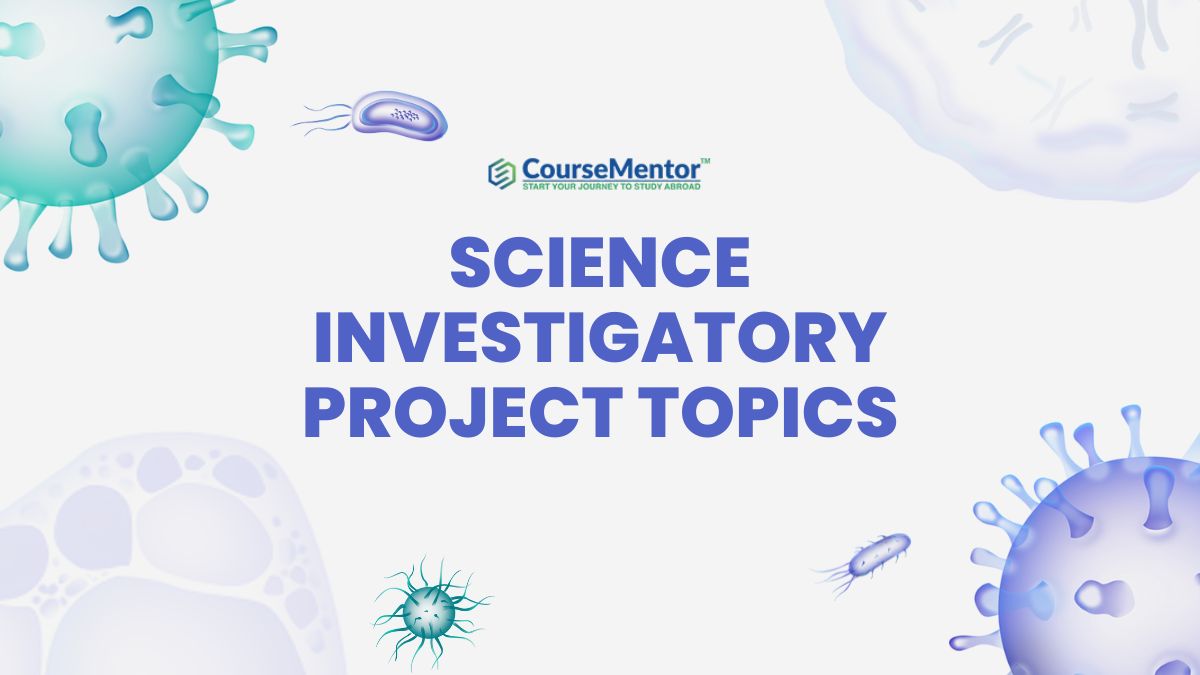
- Post author By admin
- September 29, 2023
Explore a wide range of science investigatory project topics to engage in innovative research and make significant contributions to the field.
Get ready to dive headfirst into the thrilling world of Science Investigatory Project (SIP) topics! Imagine a journey where you become a scientist, an explorer of the unknown, and a solver of real-world puzzles.
This is what SIP offers – a chance to channel your inner curiosity and creativity into the fascinating realm of science.
From unlocking the secrets of life in biology to experimenting with the wonders of chemistry, from unraveling the mysteries of the universe in physics to addressing vital environmental issues – SIP topics are your keys to a world of exploration.
In this adventure, we’ll guide you through an array of captivating SIP ideas. These topics aren’t just assignments; they’re opportunities to uncover new knowledge, make a difference, and have a blast along the way.
So, gear up for an exciting journey, as we unveil the science topics that could spark your imagination and fuel your passion for discovery. Let’s begin!
Table of Contents
What is a Science Investigatory Project?
Imagine stepping into the shoes of a scientist – asking questions, running experiments, and discovering the secrets of the world around you. That’s exactly what a Science Investigatory Project, or SIP, is all about.
At its core, a SIP is a thrilling journey of scientific exploration. It’s a project that challenges you to pick a problem, make educated guesses (that’s your hypothesis), roll up your sleeves for experiments, collect data, and connect the dots to find answers.
Here’s how it works
Step 1: the mystery.
You start with a question – something that piques your curiosity. It could be anything from “Why do plants grow towards the light?” to “What makes the sky blue?” Your SIP is your ticket to unravel these mysteries.
Step 2: The Guess
Next comes your hypothesis – a fancy word for your best guess at the answer. It’s like saying, “I think this is what’s happening, and here’s why.”
Step 3: The Detective Work
Now, it’s time for the fun part – experimenting! You set up tests, tweak variables, and observe closely. Whether you’re mixing chemicals, observing insects, or measuring temperature, you’re the scientist in charge.
Step 4: Clues and Evidence
As you experiment, you collect clues in the form of data – numbers, measurements, observations. It’s like gathering puzzle pieces.
Step 5: The “Aha!” Moment
When you analyze your data, patterns start to emerge. You connect those puzzle pieces until you have a clear picture. Does your data support your guess (hypothesis), or do you need to rethink things?
Step 6: Sharing Your Discovery
Scientists don’t keep their findings to themselves. They share them with the world. Your SIP report or presentation is your chance to do just that. You explain what you did, what you found, and why it matters.
So, why do SIPs matter? They’re not just school projects. They’re your chance to think like a scientist, ask questions like a detective, and discover like an explorer. They’re where you become the expert, the innovator, the problem-solver.
From the mysteries of biology to the wonders of chemistry and the enigmas of physics, SIPs open doors to countless adventures in science. So, what question will you ask? What mystery will you solve? Your SIP journey awaits – embrace it, and you might just uncover something amazing.
Choosing the Right SIP Topic
Choosing the right Science Investigatory Project (SIP) topic is like selecting a path for your scientific adventure. It’s a critical decision, and here’s how to make it count:
Follow Your Passion
Your SIP topic should resonate with your interests. Pick something you’re genuinely curious about. When you’re passionate, the research becomes a thrilling quest, not a chore.
Real-World Relevance
Consider how your topic connects to the real world. Can your research shed light on a problem or offer solutions? SIPs are a chance to make a tangible impact.
Feasibility
Be realistic about the resources at your disposal. Choose a topic that you can explore within your time frame and access to equipment. Avoid overly ambitious projects that might overwhelm you.
Originality Matters
While it’s okay to explore well-trodden paths, strive for a unique angle. What can you add to the existing knowledge? Innovative ideas often lead to exciting discoveries.
Mentor Guidance
If you’re feeling uncertain, don’t hesitate to seek guidance from teachers or mentors. They can help you refine your ideas and offer valuable insights.
Remember, your SIP topic is the compass for your scientific journey. It should excite your curiosity, have real-world significance, and be feasible within your means. So, choose wisely, and let your scientific adventure begin!
Popular Science Investigatory Project Topics
Now that we’ve established the criteria for selecting a SIP topic, let’s explore some captivating ideas across various scientific domains.
- Investigating the Effects of Various Soil Types on Plant Growth
- The Impact of Different Water pH Levels on Aquatic Life
- Studying the Behavior of Insects in Response to Environmental Changes
- Analyzing the Effect of Different Light Intensities on Photosynthesis
- Exploring the Microbial Diversity in Different Soil Samples
- Investigating the Antioxidant Properties of Various Fruit Extracts
- Studying the Growth Patterns of Mold on Different Types of Food
- Analyzing the Effects of Temperature on Enzyme Activity
- Investigating the Impact of Pollution on the Health of Local Wildlife
- Exploring the Relationship Between Diet and Gut Microbiota Composition
- Developing Eco-Friendly Cleaning Products from Household Ingredients
- Investigating the Chemical Composition of Common Food Preservatives
- Analyzing the Effects of Different Chemical Reactions on Metal Corrosion
- Studying the Factors Affecting the Rate of Vitamin C Degradation in Fruit Juices
- Exploring the Chemistry Behind the Colors of Fireworks
- Investigating the Efficiency of Various Household Water Softeners
- Synthesizing Biodegradable Polymers from Natural Sources
- Studying the Chemical Reactions Involved in Baking Soda and Vinegar Reactions
- Analyzing the Impact of Acids and Bases on Tooth Enamel
- Investigating the Chemical Composition of Different Brands of Shampoos
- Designing and Testing a Solar-Powered Water Heater
- Investigating the Factors Affecting the Bounce Height of Balls
- Studying the Relationship Between Temperature and Electrical Conductivity in Materials
- Analyzing the Efficiency of Different Insulating Materials
- Exploring the Effects of Magnetism on Plant Growth
- Investigating the Behavior of Sound Waves in Different Environments
- Studying the Impact of Projectile Launch Angles on Distance
- Analyzing the Factors Affecting the Speed of Falling Objects
- Investigating the Reflection and Refraction of Light in Different Media
- Exploring the Relationship Between the Length of a Pendulum and Its Period
Environmental Science
- Analyzing the Effects of Urban Green Spaces on Air Quality
- Investigating the Impact of Microplastics on Marine Life
- Studying the Relationship Between Temperature and Ocean Acidification
- Exploring the Effects of Deforestation on Local Ecosystems
- Investigating the Factors Contributing to Soil Erosion in a Watershed
- Analyzing the Impact of Noise Pollution on Wildlife Behavior
- Studying the Relationship Between Temperature and Ice Melt Rates
- Investigating the Effect of Urbanization on Local Bird Populations
- Exploring the Impact of Air Pollution on Human Health in Urban Areas
- Analyzing the Biodiversity of Insects in Urban vs. Rural Environments
Social Sciences
- Analyzing the Impact of Social Media Use on Teenagers’ Mental Health
- Investigating the Factors Influencing Online Shopping Behavior
- Studying the Effects of Different Teaching Methods on Student Engagement
- Analyzing the Impact of Parenting Styles on Children’s Academic Performance
- Investigating the Relationship Between Music Preferences and Stress Levels
- Exploring the Factors Contributing to Workplace Stress and Burnout
- Studying the Effects of Socioeconomic Status on Access to Healthcare
- Analyzing the Factors Influencing Voting Behavior in Local Elections
- Investigating the Impact of Advertising on Consumer Purchasing Decisions
- Exploring the Effects of Cultural Diversity on Team Performance in the Workplace
These SIP topics offer a wide range of research opportunities for students in biology, chemistry, physics, and environmental science. Students can choose topics that align with their interests and contribute to their understanding of the natural world.
Conducting Your SIP
So, you’ve picked an exciting Science Investigatory Project (SIP) topic and you’re all set to dive into the world of scientific exploration. But how do you go from a brilliant idea to conducting your own experiments? Let’s break it down into easy steps:
Step 1: Dive into Research
Before you start mixing chemicals or setting up experiments, it’s time for some detective work. Dive into research! What’s already out there about your topic? Books, articles, websites – explore them all. This background study gives you the superpower of knowledge before you even start.
Step 2: Hypothesize Away!
With all that newfound wisdom, formulate a hypothesis. Don your scientist’s hat and make an educated guess about what you think will happen during your experiments. It’s like making a bet with science itself!
Step 3: Time for Action
Now comes the fun part. Design your experiments. What materials do you need? What steps should you follow? Imagine you’re a mad scientist with a plan! Then, go ahead and conduct your experiments. Be precise, follow your plan, and observe like Sherlock.
Step 4: Collect That Data
During your experiments, be a data ninja. Record everything. Measurements, observations, weird surprises – they’re all clues! The more detailed your notes, the better.
Step 5: Decode Your Findings
Time to put on your detective’s hat again. What do your data and observations tell you? Look for patterns, anomalies, and secrets your experiments are revealing. This is where the real magic happens.
Step 6: The Big Reveal
Now, reveal the grand finale – your conclusions! Did your experiments support your hypothesis, or did they throw you a curveball? Discuss what your findings mean and why they matter. It’s like solving the mystery in a thrilling novel.
Step 7: Your SIP Report
Finally, put it all together in your SIP report. Think of it as your scientific storybook. Share your journey with the world. Start with the introduction, add in your methodology, sprinkle your results and discussions, and wrap it up with a conclusion that leaves your readers in awe.
Remember, this isn’t just about science; it’s about your adventure in discovering the unknown. Have fun, be curious, and let your inner scientist shine!
What is a good topic for an investigatory project?
A good topic for an investigatory project depends on your interests and the resources available to you. Here are some broad categories and potential topics to consider:
- The Impact of Different Fertilizers on Plant Growth
- Investigating the Effect of Air Pollution on Local Plant Life
- Analyzing the Quality of Drinking Water from Various Sources
- Studying the Growth of Microorganisms in Different Water Types
- Creating Biodegradable Plastics from Natural Materials
- Investigating the Chemical Composition of Household Cleaning Products
- Analyzing the Effects of Different Cooking Oils on Food Nutrition
- Testing the pH Levels of Various Household Substances
- Studying the Behavior of Ants in Response to Different Food Types
- Investigating the Impact of Light Exposure on Seed Germination
- Analyzing the Effects of Different Music Types on Plant Growth
- Designing and Testing a Simple Wind Turbine
- Investigating the Relationship Between Temperature and Electrical Conductivity in Materials
- Studying the Behavior of Different Types of Pendulums
- Analyzing the Factors Affecting the Efficiency of Solar Panels
- Analyzing the Impact of Social Media Use on Teenagers’ Sleep Patterns
- Investigating the Factors Influencing Consumer Behavior in Online Shopping
- Studying the Effects of Different Teaching Methods on Student Learning
- Analyzing the Relationship Between Music Preferences and Mood
Computer Science and Technology
- Developing a Smartphone App for Personal Productivity
- Investigating the Factors Affecting Wi-Fi Signal Strength in Different Locations
- Analyzing the Impact of Screen Time on Productivity and Well-being
- Studying the Efficiency of Different Coding Languages in Software Development
When choosing a topic, consider your interests, available resources, and the potential impact of your project. It’s essential to select a topic that excites you and allows you to conduct meaningful research.
Additionally, check with your school or instructor for any specific guidelines or requirements for your investigatory project.
What should I do in a science investigatory project?
So, you’re all set to embark on a thrilling adventure known as a Science Investigatory Project (SIP). But where do you start, and what should you be doing? Here’s your guide to diving headfirst into the world of scientific exploration:
Choose a Topic That Sparks Your Interest
Begin by picking a topic that genuinely excites you. It should be something you’re curious about, like “Why do plants grow towards the light?” or “How does pollution affect local water quality?”
Unleash Your Inner Detective with Background Research
Dive into the world of books, articles, and online resources. Learn everything you can about your chosen topic. It’s like gathering clues to solve a mystery.
Craft Your Hypothesis – Your Educated Guess
Formulate a hypothesis. Think of it as your scientific prediction. What do you think will happen when you investigate your question? Make an educated guess and write it down.
Plan Your Scientific Experiments
Now, let’s get hands-on! Plan your experiments. What materials will you need? What steps will you follow? Imagine you’re a mad scientist with a plan to uncover the secrets of the universe!
Collect Data – Be a Data Ninja
During your experiments, be a data ninja! Record everything meticulously. Measurements, observations, quirky surprises – they’re all part of your data treasure trove.
Decode Your Findings – Be a Scientific Sleuth
Time to decode the clues! Analyze your data like a scientific sleuth. Look for patterns, unexpected twists, and, most importantly, what your experiments are trying to tell you.
Share Your Scientific Tale: The SIP Report
It’s time to tell your scientific tale. Create your SIP report – your storybook of science. Start with the introduction, add in your experiments, sprinkle with results, and wrap it up with a conclusion that leaves your readers in awe.
Share Your Discoveries with the World
If you can, share your SIP findings. Present your work to your classmates, at science fairs, or anywhere you can. Share your excitement about science with the world!
Remember, SIP isn’t just about following steps; it’s about your adventure in discovering the mysteries of the universe. So, stay curious, have fun, and let your inner scientist shine!
What are the best topics for investigatory project chemistry class 12?
Hey there, future chemists! It’s time to explore the fascinating world of Chemistry with some class 12 investigatory project ideas that will not only challenge your scientific skills but also pique your curiosity:
Water Wizardry
Dive into the world of H2O and analyze water samples from different sources – tap water, well water, and that bottled stuff. Let’s uncover the secrets of your hydration!
Biodiesel Bonanza
Ever wondered if you could turn cooking oil into fuel? Investigate the synthesis of biodiesel from everyday vegetable oils, and let’s see if we can power the future with French fries!
Vitamin C Showdown
Put on your lab coat and determine the vitamin C content in various fruit juices. Is your morning OJ really packed with vitamin C? Let’s find out!
Race Against Time – The Iodine Clock
Get ready to race time itself! Study the kinetics of the iodine clock reaction and see how factors like concentration and temperature affect this chemistry marvel.
Shampoo Chemistry
Let’s turn your shower into a science lab! Test the pH levels of different shampoos – are they gentle or are they acidic? Your hair deserves the best!
Heavy Metal Detectives
Investigate soils for heavy metals. Are there hidden dangers lurking beneath our feet? Let’s discover the truth and protect the environment.
Metal Makeover
Ever dreamed of turning ordinary objects into shimmering treasures? Electroplate items like coins or jewelry with various metals and unveil their magical transformations!
The Dye Chronicles
Explore the vibrant world of food dyes used in your favorite treats. What’s really behind those bright colors? Let’s uncover the secrets of our rainbow foods!
Solubility Sleuths
Unravel the mysteries of solubility! How does temperature impact the solubility of common salts? Let’s dissolve some science questions.
Perfume Alchemy
Dive into the world of fragrances! Analyze the chemical components in different perfumes and discover the magic behind your favorite scents.
Remember, the best project is one that not only challenges you but also stirs your scientific curiosity. Choose a topic that excites you, and let your chemistry adventure begin!
What are good science experiment ideas?
- Light Dance with Plants: Imagine plants swaying to the rhythm of light! Explore how different types of light affect plant growth – from disco-like colorful LEDs to the soothing glow of natural sunlight.
- Kitchen Warriors: Don your lab coat and investigate everyday kitchen items like garlic, honey, and vinegar as germ-fighting superheroes. Who knew your kitchen could be a battleground for bacteria?
- Animal Extravaganza: Dive into the world of critters! Observe and report on the curious behaviors of your chosen animal buddies. It’s like being a wildlife detective in your own backyard.
- Fizz, Pop, and Bang: Get ready for some explosive fun! Experiment with classic chemical reactions that sizzle and explode, like the volcanic eruption of baking soda and vinegar.
- Titration Showdown: Become a master of precision with acid-base titration. Unlock the secrets of unknown solutions, like a chemistry detective solving mysteries.
- Crystal Kingdom: Step into the magical world of crystals. Grow your own dazzling crystals and reveal how factors like temperature and concentration influence their growth.
- Swingin’ Pendulums: Swing into action with pendulums! Investigate how factors like pendulum length and mass affect the way they sway. It’s like dancing with physics.
- Machine Marvels: Enter the world of simple machines. Uncover the mechanical magic behind levers, pulleys, and inclined planes as you lift heavy objects with ease.
- Electromagnet Madness: Get electrified! Build your own electromagnet and experiment with coils and currents to see how they shape magnetic fields.
- Water Adventure: Dive into water quality testing. Collect samples from different sources and become a water detective, searching for clues about pollution and health.
- Air Expedition: Take to the skies with your own air quality station. Discover what’s floating in the air around you, from tiny particles to invisible gases.
- Climate Crusaders: Join the battle against climate change. Investigate how shifts in temperature and precipitation patterns impact your local ecosystem.
Earth Science
- Rock Detectives: Grab your magnifying glass and investigate rocks and fossils in your area. It’s like traveling through time to uncover Earth’s ancient secrets.
- Weather Watchers: Become a meteorologist with your own weather station. Predict the weather and marvel at how the atmosphere behaves around you.
- Volcano Eruption Spectacle: Get ready for volcanic eruptions without the lava! Create a stunning volcano model and watch it come to life with your own eruptions.
- Starry Nights: Explore the cosmos with a telescope and discover celestial wonders, from the rings of Saturn to the galaxies far, far away.
- Moon Phases Odyssey: Join the lunar calendar club! Track the Moon’s different faces over weeks and become an expert on lunar phases.
- Solar Eclipse Spectacle: Witness the sky’s ultimate blockbuster – a solar eclipse! Safely observe this cosmic dance with eclipse glasses and telescopes.
These science experiments are not just about learning; they’re about unleashing your inner scientist and having a blast along the way! So, pick your favorite, put on your lab coat, and let the science adventures begin!
In wrapping up our exploration of Science Investigatory Project (SIP) topics, it’s clear that we’ve uncovered a treasure trove of possibilities. These topics are more than just words on a page; they’re gateways to adventure, inquiry, and understanding.
We’ve ventured into diverse realms of science, from the secrets of plant life to the hidden chemistry of everyday items. We’ve danced with the laws of physics, delved into environmental enigmas, and probed the complexities of human behavior. These topics aren’t just ideas; they’re invitations to explore the wonders of our world.
So, as you consider your own SIP journey, let your curiosity be your compass. Pick a topic that truly intrigues you, one that keeps you awake at night with questions. Embrace the process – the experiments, the surprises, and the “Aha!” moments.
Remember, it’s not just about reaching a conclusion; it’s about the exhilarating path you take to get there. SIPs are your chance to be a scientist, an explorer, and a storyteller all at once. So, go ahead, choose your topic, embark on your adventure, and share your discoveries with the world. Science is waiting for your curiosity to light the way!
Frequently Asked Questions
1. how long does it typically take to complete a science investigatory project, the duration of an sip varies, but it generally spans a few months to a year, depending on the complexity of the topic and available resources., 2. can i work on an sip alone, or is it better to collaborate with classmates, you can choose to work on an sip individually or in a group. both approaches have their advantages, so it depends on your preference and the project’s requirements., 3. are there any age restrictions for participating in sips, sips are typically undertaken by students in middle school and high school, but there are no strict age restrictions. anyone with a passion for scientific inquiry can engage in an sip., 4. how can i find a mentor or advisor for my sip, you can seek guidance from science teachers, professors, or professionals in your chosen field. they can provide valuable insights and support throughout your sip journey., 5. where can i showcase my sip findings, you can present your sip findings at science fairs, school exhibitions, or even submit them to relevant scientific journals or conferences for broader recognition..
- australia (2)
- duolingo (13)
- Education (285)
- General (77)
- How To (18)
- IELTS (127)
- Latest Updates (163)
- Malta Visa (6)
- Permanent residency (1)
- Programming (31)
- Scholarship (1)
- Sponsored (4)
- Study Abroad (187)
- Technology (12)
- work permit (8)
Recent Posts


COMMENTS
Live Science Health: You can search this site for articles on science topics, including health science. This site often gives you links to original articles and government reports that can help you do your research. Medical News Today: Contains over 250,000 articles on various health topics. This site gives concise explanations of current ...
As we learn from experiments, science and technology move forward. The controlled setting of experiments helps researchers gain new knowledge. Experiments will continue helping us make new findings and innovations. How to Select Experimental Research Topics. Selecting experimental research topics can be exciting yet challenging.
Science Research Topics for STEM Students. Science offers a diverse range of research avenues. Here are 10 science research topics for STEM students: Investigating the potential of gene editing techniques like CRISPR-Cas9 in curing genetic diseases. Studying the ecological impacts of species reintroduction programs on local ecosystems.
Chances are good you probably did easy science experiments like this when you were in school. The baking soda and vinegar balloon experiment demonstrates the reactions between acids and bases when you fill a bottle with vinegar and a balloon with baking soda. Learn more: Baking Soda and Vinegar Balloon (Guide + Printable Reflection Sheet)
Conclusion: 100 Experimental Research Topics for Students. Experimental research is a pivotal component of scientific exploration. It empowers us to establish causal relationships, expand our comprehension of the world, and discover solutions to issues across diverse fields of study.
Experimental research is essential in science, technology, engineering, and mathematics because it allows students to ask questions, test ideas, and discover new facts. According to the National Science Foundation, hands-on experiences significantly improve understanding of scientific concepts.
Explore 121+ experimental research topics across psychology, biology, physics, and education. Uncover diverse topics. ... it uncovers the mysteries of genetics, ecology, and environmental science. Physics relies on experimental research to test and refine theories, while education benefits from insights into effective teaching methods and ...
300 Science Thesis Topics and Ideas. Science is a vast and ever-evolving field that encompasses numerous disciplines and research areas. From the complexities of molecular biology to the abstract theories of applied mathematics, science provides a broad range of opportunities for inquiry.
Choosing the Right SIP Topic. Choosing the right Science Investigatory Project (SIP) topic is like selecting a path for your scientific adventure. It's a critical decision, and here's how to make it count: Follow Your Passion. Your SIP topic should resonate with your interests. Pick something you're genuinely curious about.
Top 50 Experimental Research Topics for School and College Students. April 13, 2024 by Faizan. The foundation of academic inquiry is experimental research, which gives students the chance to explore new areas, question preconceived notions, and add to the body of knowledge that is always growing. Experimental research offers school-age and ...